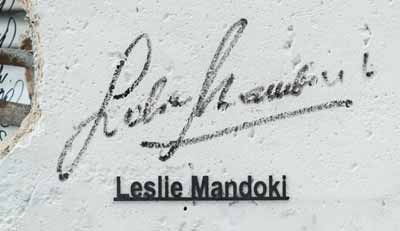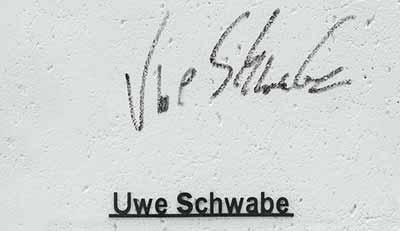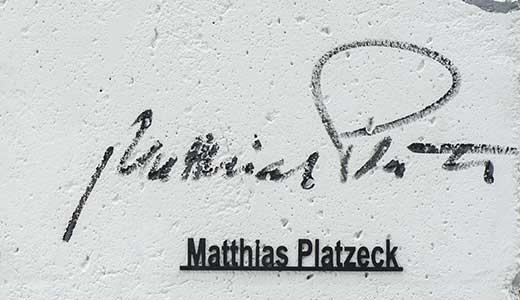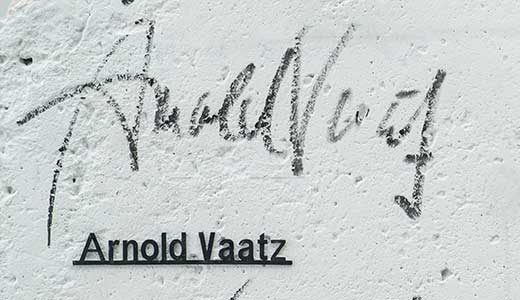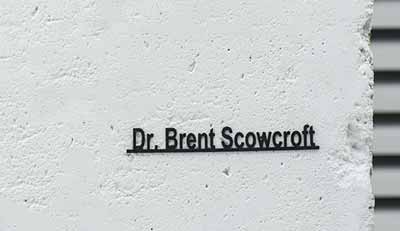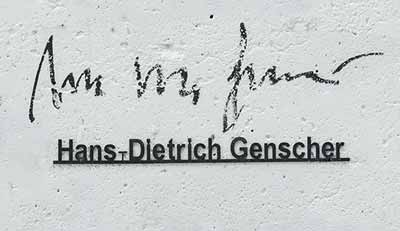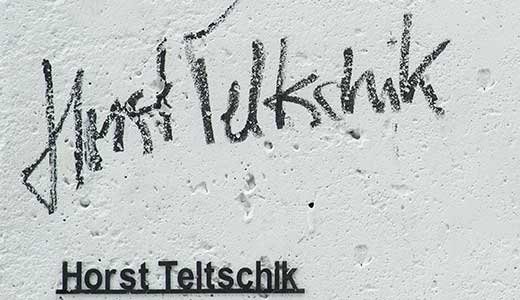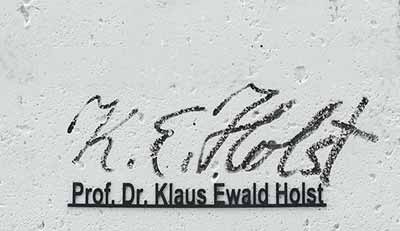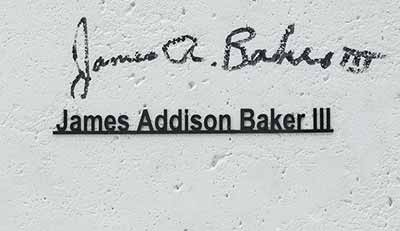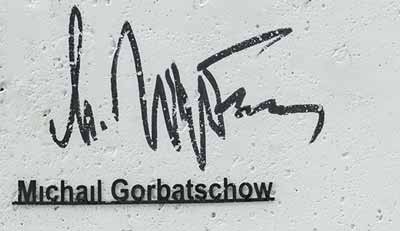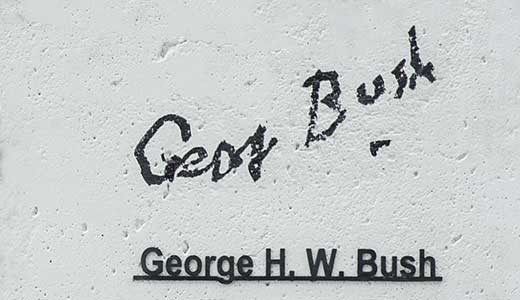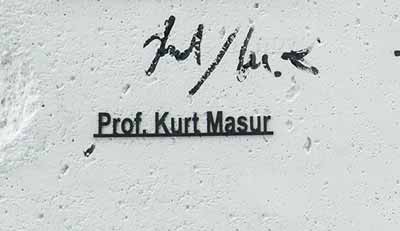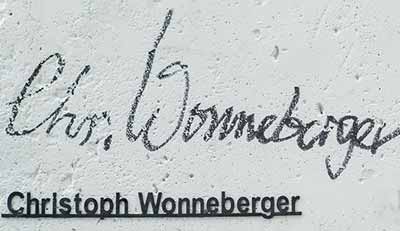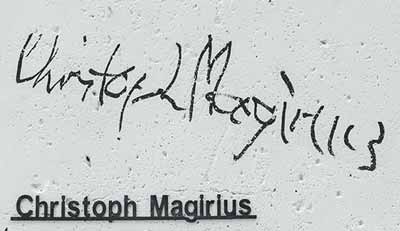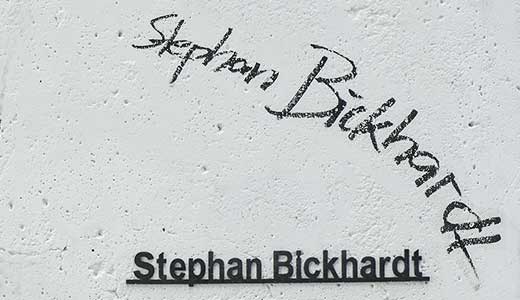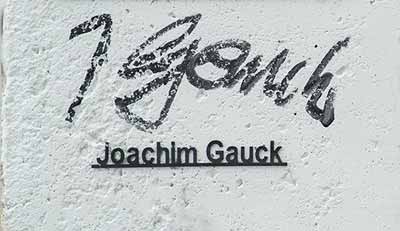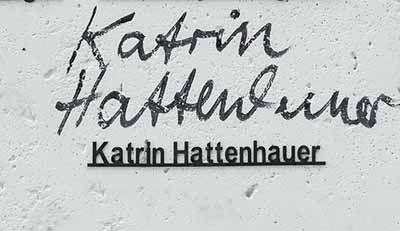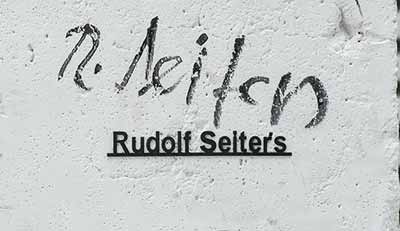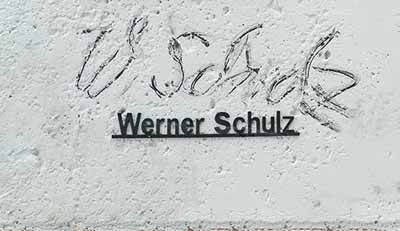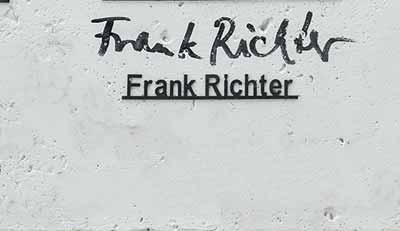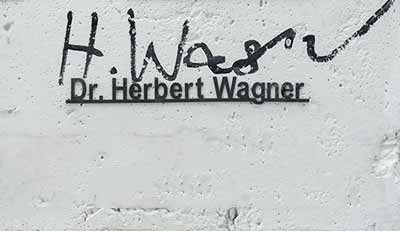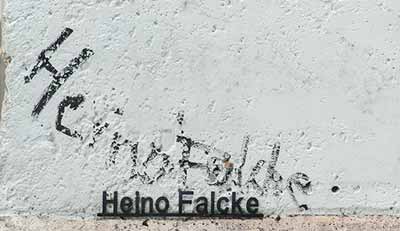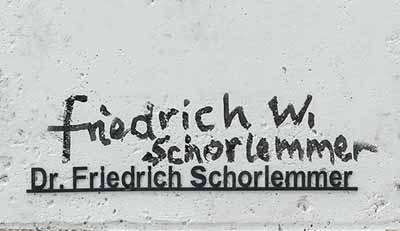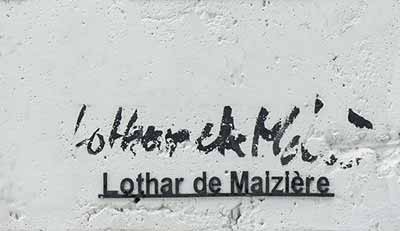Piece of the Berlin wall
The Peaceful Revolutions in 1989/90 – A Foundation for the Future of Europe
The year 2014 marks the twenty-fifth anniversary of the democratic and largely peaceful revolutions in Central and Eastern Europe against the communist dictatorships. The cycle of revolutions in 1989/90 was an outstanding event in Europe’s history of freedom. Communism, the Cold War and the division of Europe were all brought to an end by the rapid turn of events...
read morePreface
The Peaceful Revolutions in 1989/90 – A Foundation for the Future of Europe
The year 2014 marks the twenty-fifth anniversary of the democratic and largely peaceful revolutions in Central and Eastern Europe against the communist dictatorships. The cycle of revolutions in 1989/90 was an outstanding event in Europe’s history of freedom. Communism, the Cold War and the division of Europe were all brought to an end by the rapid turn of events. The revolutions paved the way to democracy and self-determination for the people of Central and Eastern Europe. Any national resentment was overcome by the widespread sense of shared freedom and solidarity. Europe’s history in the second half of the twentieth century holds out the promise not of a world without contradictions, but of a large community which, mindful of the historical disasters which have emanated from Europe, has learned how to bring about development and progress by civil means.
The Peaceful Revolutions were part of the heritage of those spiritual elements making up the core of Europe’s political identity: the rule of law, critical thought, active participation in the community, tolerance, freedom and equality as well as solidarity and democracy. And they also include the struggle for the human dignity of the individual as well as resistance and opposition to tyranny, domination and dictatorship.
In Germany, the demonstration in Leipzig against the regime by well over 70,000 protesters on 9 October 1989 was a turning point.
Consequently, Leipzig became a bastion of the Peaceful Revolution, and hence an important place of democratic tradition. It was Leipzig where the fall of the SED’s dictatorship started, and where the road to German and European unification began. This is not to belittle the revolutionary uprisings in Dresden, Chemnitz and Plauen, in East Berlin, Potsdam, Halle, Magdeburg, Erfurt and elsewhere. Ultimately, the dictatorship was defeated by the people not only in the cities of the GDRbut also in countless small towns and villages as well as out in the countryside.
The second major event in autumn 1989 was the fall of the Berlin Wall on 9 November 1989. It was only made possible by the human throngs on the streets of East Berlin, who more or less flattened the border crossings to West Berlin. They ushered in German unity and the collapse of the ‘Yalta system’ in a process which involved many, many other people from Germany and abroad prompted by other reasons such as the mass exodus from the East and the collapse of the ‘real socialist’ systems. However, unity already existed between the demonstrators out on the streets and those who brought down the Berlin Wall. Accordingly, it was both right and proper to have completely different people participate in the ‘Mauerfälle’ project. In it, east German civil rights activists and theologians – not only from Leipzig – have come together with foreign politicians who made outstanding contributions to the process of German unification. The segment of the Berlin Wall has been signed by the German politicians responsible for unification, just as it has been by their colleagues from the USA as well as Mikhail Gorbachev and Lech Wałęsa. And they have been joined by other people who advanced the process of unification in Germany and the re-establishment of democracy in its eastern regions as well as a Hungarian dissident and artists of world renown. The result is a very successful combination of people.
Yet throughout this project, our gaze keeps returning to Leipzig with its civil rights activists, alternative groups and members of the ‘counter-culture’ who fought for freedom, democracy and self-determination. The partial cooperation between church-based action groups and would-be émigrés in Leipzig was important in the 1980s, as was the fact that the resistance groups were able to seek refuge in churches such as St Luke’s and St Mark’s and later St Nicholas’s with its prayers for peace. It was from resistance by individuals that the Peaceful Revolution emerged in 1989/90. There are various reasons why it did not end in a bloodbath, albeit with an inexplicable factor frequently referred to as a miracle. What is certain is that the resistance and rebellion against the SED dictatorship in Leipzig are one of the main chapters of Germany’s historical culture and European integration. This is something that the public must be repeatedly reminded of – especially in this, the twenty-fifth anniversary of the 1989/90 revolution.
Although it ought to go without saying that this democratic achievement by the citizens of Leipzig and East Berlin as well as other people from East Germany deserves appreciation and respect in present-day Germany, all sorts of problems get in the way. It evidently has to be emphasized again and again that the Peaceful Revolution against above all the communist dictatorship is a prominent episode in the German and, ultimately, European or Western history of freedom. The critical dates were 9 October and 9 November 1989 which, as the climax of a complex and dramatic development, ultimately decided between war and peace, freedom and dictatorship, totalitarianism and democracy, continuity and a new beginning – and not just in the GDR. After all, these endeavours were undoubtedly rooted in a larger, partly international setting. But on 9 October 1989, peace was enforced for good in Leipzig, and the same was true for the freedom of assembly and free speech, the right to political participation, the fight for independent democracy, and freedom of expression and the press. This could not have been achieved without Leipzig’s protesters with their courage, creativity and public activities – although the prayers for peace at St Nicholas’s Church with their motto ‘Open to everyone’ – including would-be émigrés – were just as important. Ultimately, the revolution against the German communist dictatorship was won on the streets.
The triumph of the Peaceful Revolution in East Germany was related to the attainment of the Germans’ centuries-old dream of unity in freedom. In international terms, the Peaceful Revolution within the Central and Eastern European cycle of revolutions neutralized the impact of the 1917 Bolshevik coup and put an end to the post-war order decided at the Yalta Conference. A revolution of this import and this European relevance undoubtedly belongs to the canon of not only Saxon and German but also European places of commemoration. History was written in East Germany in autumn 1989. And this is of lasting importance.
click on an image, to see the biography
-

Leslie Mandoki
show biographyLeslie Mandoki
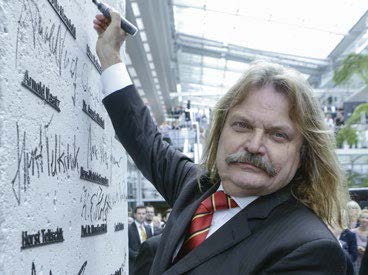
Leslie Mandoki was born as László Mándoki on 7th January 1953 in Budapest, Hungary. He studied at the Conservatory of Music in Budapest. The communist dictatorship persecuted him as a supporter of the student opposition and imposed a stage ban. This is why in 1975 the musician and two other artists escaped from Hungary via Austria to the German Federal Republic, whose citizen he later became. When asked about his plans upon his arrival at the center for asylum seekers, he answered that he had come to freedom in order to make music - together with his musical role models such as Ian Anderson of Jethro Tull, Jack Bruce of Cream and Al Di Meola.
Initially he found almost unwanted commercial success as singer of the group „Dschinghis Khan“ with no. 1 hits in many countries as well as countless awards.
But also his dream of old has come true long since, and over the years has developed into a band like no other, with more than 10 record releases and countless concerts in the whole world – the ManDoki Soulmates. With his passion for jazz-rock of the 1970s and intellectual pop music, Mandoki unites in his band Soulmates jazz and rock icons such as Ian Anderson (Jethro Tull), Jack Bruce (Cream), Chris Thompson (Manfred Mann’s Earth Band), David Clayton-Thomas (Blood Sweat & Tears), Bobby Kimball (Toto), Greg Lake (Emerson, Lake & Palmer), Nick van Eede (Cutting Crew), Michael and Randy Brecker (repeated Grammy-winner), Nik Kershaw, Steve Khan, Al Di Meola, Bill Evans (Miles Davis-Band), Anthony Jackson (Steely Dan, Paul Simon, Bee Gees, C. Corea) and Victor Bailey (Madonna, Weather Report, Mary J. Blige), Chaka Khan, Steve Lukather (Toto), John Helliwell (Supertramp), Eric Burdon as well as outstanding German artist colleagues such as Peter Maffay, Till Brönner, David Garrett or Udo Lindenberg. In the spring of 2013 the Man Doki Soulmates celebrated their 20th anniversary with a big concert in the Palace of the Arts in Budapest.
As a producer Mandoki works with many international stars such as Lionel Richie, Phil Collins, Joshua Kadison or Jennifer Rush. In the area of film music Mandoki has acted as Musical Director of Walt Disney as well as worked for TV productions, for example as the composer of the title song of Europe’s most successful telenovela „Sturm der Liebe“ (Storm of Love).
The world star considers himself a representative of Branded Entertainment: he produces musical ideas, develops programs and musical formats for the musical emotionalization of international top-class companies of various sectors.
Mandoki has been the Musical Director of Volkswagen for 10 years, he produced music for FC Bayern Munich as well as campaign songs for the Christian Democratic Party (CDU/ CSU) in 2009 and 2013 and music for their 2014 election campaign for the European parliament.
His music production is also about emotionalizing movements and in this field he frequently cooperates with creators, musicians and important personalities of international politics, economics and society. This work has brought about conversations with internationally distinguished politicians. For the 60th birthday of German Chancellor Angela Merkel he presented her favorite song „Wir lieben die Stürme“ together with other politicians and the German singer Heino.
Due to his experiences in Hungary Mandoki has often been interested in the situation of East Germans and considers the Peaceful Revolution as a proud and outstanding event in German history. He has frequently been active for humanitarian projects: under the auspices of Michail Gorbatschow he composed a musical cross-over project based on traditional Russian melodies for the European youth, and he has participated in charity galas.
Mandoki is married, father of three children and lives in Tutzing, Bavaria at Lake Starnberg. Here he aims at putting into practice his guiding principle: “live your dreams and don’t dream your life”.
close -

Uwe Schwabe
show biographyUwe Schwabe
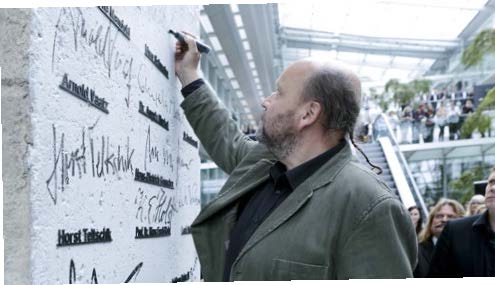
Uwe Schwabe from Leipzig was born on 4 May 1962. On leaving school he completed an apprenticeship as a maintenance mechanic. During this time, he lived with his mother who worked on rotating shifts and three siblings, and was also a carer for his bedridden grandmother. Keen to go to sea, he signed up for three years with the NVA. However, his constant refusal to accept military discipline put an end to his seafaring ambitions. In autumn 1988, Schwabe refused to join the reserves and was demoted from sergeant to the ranks.
Following his time with the NVA, Schwabe worked as a maintenance mechanic. However, he quit in 1987 and survived on odd jobs like selling mulled wine at the Leipzig Christmas Market. From 1988 – 1990, he was employed at Albert Schweitzer House, a Protestant retirement and care home – an experience that had a lasting impact on him.
In 1984, Schwabe became a non-Christian member of the Working Group on Environmental Protection at the Protestant youth pastorate as well as of the Human Rights Group. In 1987 he was one of the founders of the ‘Initiative Group Life’. In 1984, Schwabe began to be involved in the preparation and implementation of the peace prayers at St Nicholas’s Church in Leipzig and took part in demonstrations outside the same church. In addition to tackling environmental problems, Schwabe became increasingly concerned with campaigning for more democratic reforms in the communist dictatorship. He participated in several activities by the Leipzig opposition. These included the Olof Palme Peace March against rearmament and militarization, the River Pleisse Memorial Marches in 1988 and 1989 drawing attention to its pollution, the Leipzig Street Music Festival in the summer of 1989, and protests following the massacre on Tiananmen Square in Beijing at the Church Congress of the Saxon Evangelical Church at about the same time. In 1989, he was one of the founders of New Forum in Leipzig, becoming its regional spokesperson and participating in many of the Monday Demonstrations. He was monitored by the Stasi in two separate operations.
In January 1989, Uwe Schwabe was held in custody after distributing leaflets calling for a demonstration for freedom of expression in connection with the official march to commemorate Rosa Luxembourg and Karl Liebknecht. In 1989, the Stasi placed him at the top of its list of members of the opposition in Leipzig who were to be interned in the event of a crisis.
Schwabe has been engaged in civil society in various ways since German reunification. For example, he co-founded and became the chairman of the Leipzig Citizens’ Movement Archive. He also helped set up ‘Aid for Romania – Round Table Foundation’, and in 2014 he established a group to show solidarity with the democratic forces of the Maidan uprising in Kiev.
Uwe Schwabe lives in Leipzig and is married with two children. He works as a curator at Leipzig Forum of Contemporary History. He has received various awards for his services in the anti-communist opposition, his prominent role in the Peaceful Revolution, and his analysis of the communist dictatorship. He is a recipient of the Federal Order of Merit and in 2014 received the German National Prize together with other Leipzig civil rights activists and the Leipzig Citizens’ Movement Archive.
In 2012, Uwe Schwabe attended the 12 th Federal Assembly to elect the German President, having been nominated by the SPD and Alliance ’90/ The Greens.
close -

Matthias Platzeck
show biographyMatthias Platzeck
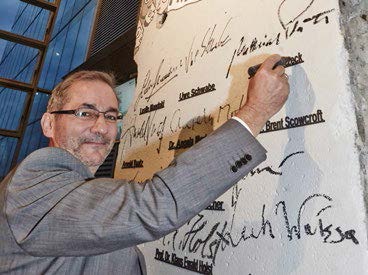
Matthias Platzeck was born the son of an ear, nose and throat specialist and a medical laboratory technician on 29 December 1953 in Potsdam. In 1972 he passed the Abitur at a secondary school in Kleinmachnow before doing national service with the NVA from 1972 – 1974. He then studied biomedical cybernetics at Ilmenau University of Technology in Thuringia, graduating in 1979 as a qualified engineer. From 1979 to 1980, Platzeck was a research associate at the Institute for Air Hygiene in Karl-Marx-Stadt (Chemnitz) before becoming financial and technical director at Bad Freienwalde (Oder) Hospital. From 1982 – 1987, he took a postgraduate distance education course in environmental health at the Academy for Medical Education in East Berlin, and from 1982 – 1990 worked as the Head of the Department of Environmental Hygiene at the Potsdam Department of Hygiene Inspection.
Platzeck’s involvement with the political opposition began in April 1988 when he was a founding member of the Potsdam citizens’ initiative ‘Association for Environmental and Urban Design’ (ARGUS). In May 1989 he joined the Liberal Democratic Party, but left this bloc party soon after. In the revolutionary November of 1989, ARGUS was one of the founding members of the opposition group ‘Green League’, and Platzeck was a member of the group’s Federal Council. From December 1989 to February 1990 he was a representative at the Central Round Table of the GDR in East Berlin. In the transitional government before the first free parliamentary elections on 18 March, he was appointed minister without portfolio (until April 1990), was a member of parliament representing the Green Party, and the parliamentary whip for Alliance ’90/The Greens. After German reunification, he was one of the members of the People’s Chamber to be delegated to the all-German Bundestag. At the same time, he was a member of the Brandenburg regional parliament, to which he belonged on behalf of Alliance ’90 until September 1992, and which in November 1990 elected him Minister for the Environment, Nature Conservation and Regional Planning. Platzeck remained minister until November 1998 and was partly responsible for designating 40 percent of the Brandenburg region into conservation areas.
Since he objected to the merger of Alliance ’90 (whose Federal Council he belonged to) with the West German Greens, in 1993 Platzeck was not attached to any political party and so teamed up with Günter Nooke to establish ‘BürgerBündnis’ (‘Citizens’ Alliance’). In June 1995, he finally joined the SPD. Platzeck became famous throughout Germany in August 1997 as a crisis manager after the disastrous flooding of the River Oder. His term as minister was followed by a spell as Mayor of Potsdam from November 1998 to June 2002. In August 1999, he joined the Federal Executive of the SPD and was the party’s regional chairman in Brandenburg from 2000 until 2013. During this time, he was the Minister-President of Brandenburg from June 2002 to August 2013 and returned to the regional parliament in 2004. Criticism of the coalition agreed with the PDS’s successor The Left was rejected by Platzeck. Matthias Platzeck was elected Chairman of the Social Democratic Party of Germany in November 2005, but stepped down in April 2006 for health reasons. Due to various illnesses, in July 2013 he announced his resignation as Minister-President of Brandenburg and regional chairman of the SPD with effect from the following month. He did not stand in the regional elections in 2014. In October 2003 he became one of the region of Brandenburg’s four representatives on airport development company Flughafen Berlin Brandenburg GmbH and also joined organizations such as the German-Russian Forum.
Matthias Platzeck rejoined the Protestant Church in 2003 and now lives in the Babelsberg district of Potsdam. He has three daughters from a marriage which was dissolved in 1984; his current wife, whom he married in 2007, brought a daughter into their marriage. Among the many distinctions he has received are the Great Order of Merit with Star and Sash of the Federal Republic of Germany and the Brandenburg Order of Merit.
close -

Arnold Vaatz
show biographyArnold Vaatz
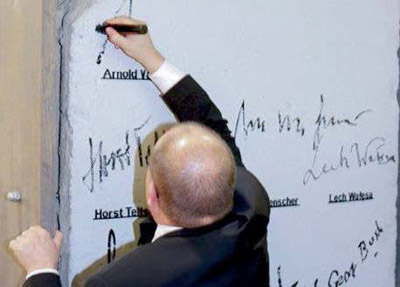
Mathematician Arnold Vaatz was born on 9 August 1955 in Weida, Thuringia, and passed the Abitur school-leaving examination in Greiz in 1974. After eighteen months’ basic military service in the NVA,he earned a degree in mathematics in 1981. On graduating from university, he worked as a research assistant. In 1987, Vaatz was appointed head of IT at the VEB Komplette Chemieanlagen Dresden, a nationalized company that built chemical plants. In late 1982, Vaatz refused to do a spell of reserve duty in the NVA and was punished with six months’ imprisonment, which entailed forced labour at the Maxhütte steel mill in Unterwellenborn.
During the 1989 Peaceful Revolution, Vaatz joined New Forum and become its spokesperson. In October he worked in the ‘Group of 20’ in Dresden and played a crucial role in the occupation of the Dresden headquarters of the Stasi. Together with Steffen Heitmann, destined to become Saxony’s Minister of Justice, Vaatz was instrumental in the citizens’ committee charged with disbanding the Stasi’s regional and district offices in Dresden. In February 1990, Vaatz joined the CDU. Before German reunification in October, he was appointed deputy commissioner for the Dresden region and involved in the foundation of the Free State of Saxony as chairman of the relevant coordination committee under de Maizière’s government. Following the formal establishment of Saxony on 3 October 1990, he was placed in charge of the State Chancellery from 1990 – 1991. Afterwards, he was Saxony’s Minister for the Environment and Regional Development from 1992 – 1998. He also played a prominent role in party politics from 1993 – 1995 as deputy regional chairman of the CDU in Saxony. And from 1990 – 1998, Vaatz was a member of Saxony’s regional parliament.
After switching to federal politics, Vaatz has been a directly elected member of the German Bundestag since 1998 and also deputy chairman of the CDU/CSU parliamentary group since 2002. In the Bundestag, he has been a deputy member of the Committee on Transport and Digital Infrastructure, the Committee on Human Rights and Humanitarian Aid, the Committee for the Reconstruction of Eastern Germany, and the Arbitration Committee. He has been on the National Board of the CDU on two occasions: from 1996 – 2000, and since 2002. Moreover, he was a member of Presidium of the CDU from 1998 – 2000.
Arnold Vaatz is critical of the German government’s decision to phase out nuclear power. In Dresden, he was a proponent of the controversial construction of Waldschlösschen Bridge. In addition, this somewhat contentious Christian Democrat has made a name for himself as a writer. Mention must also be made of his socio-political activities, his efforts to ensure discussion about the communist dictatorship in Germany, and his efforts to bring about the political renewal of the CDU in Saxony after the Peaceful Revolution and reunification. Arnold Vaatz is married with four children. He has received a string of prestigious awards, including the Saxon Order of Merit and – together with other civil rights activists – the Federal Order of Merit, First Class for his involvement in the Peaceful Revolution.
close -

Dr. Angela Merkel
show biographyDr. Angela Merkel

Angela Merkel was born Angela Dorothea Kasner on 17 June 1954 in the Hamburg district of North Barmbek, the first child of Lutheran theology student Horst Kasner and teacher Herlind Kasner. Later that year, Horst Kasner received a pastorate in Quitzow in the region of Brandenburg. In 1957, the family moved to a new home not far from Templin, where Kasner was to head Waldhof Theological Seminary.
Angela Merkel took confirmation in 1967. In 1968 or thereabouts, like almost all youngsters in the GDR, she joined the FDJ, East Germany’s mass youth movement. In 1973 she scored top marks in her Abitur at school in Templin and enrolled on a physics degree at Karl Marx University in Leipzig. While there, she was in touch with the Protestant Student Community. After graduation, she became a research assistant in quantum chemistry at the Central Institute for Physical Chemistry of the East German Academy of Sciences. In 1986 Angela Merkel was awarded a doctorate for her thesis on the calculation of rate constants of reactions involving simple hydrocarbons.
Angela Merkel did not belong to the anti-communist opposition in the GDR. However, during the Peaceful Revolution in autumn 1989, she joined the civil rights movement and the political party Democratic Awakening. She became its spokesperson in February 1990 and began working alongside party chairman Wolfgang Schnur (who shortly afterwards was exposed as a Stasi informer). Following a suggestion by Volker Ruhe, the Secretary-General of the West German CDU, on 5 February 1990 Democratic Awakening joined forces with the German Social Union and the East German CDU to forge the ‘Alliance for Germany’. On 18 March, the Alliance for Germany won East Germany’s first free parliamentary elections. After the elections, Merkel was appointed deputy spokesperson of Lothar de Maizière’s coalition government. In August 1990, she joined the East German CDU, which having merged with Democratic Awakening that month, was united with its West German sister party on 2 October. The main questions on the political agenda concerned German reunification – and Merkel was actively involved in this process.
After reunification, Merkel was employed as an adviser in the Federal Government’s Press and Information Office. She was also elected to the German Bundestag as a direct candidate representing the constituency of Stralsund–North Pomerania–Rügen on 2 December 1990. After Helmut Kohl had been elected the first all-German Chancellor by the Bundestag on 17 January 1991, he brought this ‘newcomer’ into his cabinet as the Federal Minister for Women and Youth. At the CDU Congress in Dresden the following December, Merkel succeeded de Maizière as deputy party chairman. From 1992 – 1993, she chaired the Protestant Working Group of the CDU-CSU and from 1993 was placed in charge of the CDU’s regional branch in Mecklenburg-Western Pomerania. After the coalition government comprising the CDU, CSU and the FDP was re-elected on 16 October 1994, Merkel was made the Federal Minister for the Environment, Nature Conservation and Nuclear Safety. As such, she was the president of the United Nations Climate Change Conference in Berlin in March/April 1995.
On 27 September 1998, the coalition was defeated in the general election – the first occasion on which a reigning federal government of Germany had been voted out. In November, the CDU elected Angela Merkel its Secretary-General on 7 November after she had been nominated by Wolfgang Schäuble. In 1999, she published an open letter in the Frankfurter Allgemeine Zeitung calling on the CDU to distance itself from honorary chairman Helmut Kohl after he had refused to reveal the sources of illegible donations to the party. In April 2000, the CDU voted Merkel party leader at its national congress in Essen, and in 2002 she was appointed head of the CDU/CSU parliamentary group and hence the leader of the opposition in the Bundestag. As far as her political views were concerned, she fully supported the USA during the Iraq War in 2003 and 2004, called for a simplified tax system and changes to social security, and campaigned for a ‘privileged partnership’ between Turkey and the European Union.
After the early parliamentary elections on 18 September 2005, Merkel (who had fronted the campaign by the CDU and CSU) was declared the youngest and first female German Chancellor on 22 October thanks to votes from not only the CDU and CSU but also the SPD. In 2007, Angela Merkel held the presidency of the Council of the European Union for six months, since when she has been viewed by many as the most powerful woman in the world. After the next general election on 27 September 2009, Merkel spearheaded a coalition with the FDP, while four years later, following parliamentary elections on 22 September 2013, she headed a grand coalition with the SPD. She roundly condemned the electronic surveillance of the German population and even the tapping of her own mobile phone by the NSA.
Angel Merkel is committed to a ‘United States of Europe’. She supports the policy of maintaining a single currency by means of a European stability mechanism, overcoming the economic crisis, and a strict course of austerity for a united Europe. She is a supporter of military peacekeeping operations and emphasizes Germany’s responsibility for the state of Israel. Domestically, Angela Merkel is committed to the integration of Muslims in Germany. She switched to a policy of phasing out nuclear power after the Fukujima disaster in Japan, supported the discontinuation of compulsory military service, and also gave firm backing to new child and youth welfare legislation.
Angela Merkel divorced her first husband before marrying Professor Joachim Sauer. Although she has no children of her own, Joachim Sauer brought two sons from his first marriage into their joint partnership. Merkel has been presented with some of the very highest German and foreign awards such as the Grand Order of Merit of the Federal Republic of Germany, the USA’s Presidential Medal of Freedom, and a host of distinctions from countries such as Bulgaria, Israel, Italy, Norway, Peru, Portugal and Saudi Arabia. She has also received several private awards and honorary doctorates.
close -

Dr. Brent Scowcroft
show biographyDr. General Brent Scowcroft
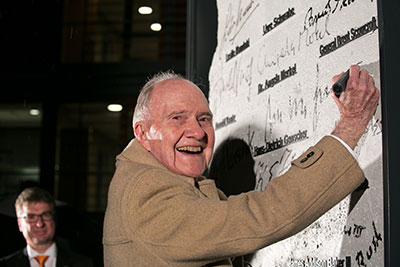
Brent Scowcroft was born on 19 March 1925 in Ogden, Utah, where he also grew up. After completing pilot training, he studied at the United States Military Academy at West Point in New York before earning a PhD from Columbia University. During his military career, he worked his way up to the rank of Lieutenant General before retiring in 1975.
In this time, he held posts in the US Air Force, at the Academy as head of the Department of Political Science, at the Ministry of Defense, and also West Point, where he taught Russian history. For a while he was also Assistant Air Attaché at the American Embassy in Belgrade, Yugoslavia. He served as the National Security Advisor to both Presidents Gerald Ford (1975 – 1977) and George H. W. Bush (1989 – 1993), the only individual in US history appointed to the position under two different presidents.
From 2001 to 2005, Scowcroft was Junior Chairman of the Foreign Intelligence Advisory Board under President George W. Bush. In his advisory role, he supported the mission in Afghanistan as a direct blow against terrorism, yet criticized the invasion of Iraq and President Bush’s security policy.
Prior to working for President George H. W. Bush, Scowcroft was Vice Chairman of Kissinger and Associates, Inc. from 1982 – 1989, where he advised American and foreign companies on joint ventures, strategic planning and risk assessment. He was also founder and President of the International Policy Forum and, being one of the leading US experts on security policy, is President of The Scowcroft Group, a business advisory firm.
The many military and civilian American and international awards received by Brent Scowcroft include the Presidential Medal of Freedom and the Great Order of Merit with Star and Sash of the Federal Republic of Germany. He recorded his memories of the decline and fall of the Soviet Union in a book written with George H. W. Bush entitled A World Transformed.
close -

Hans Dietrich Genscher
show biographyHans Dietrich Genscher
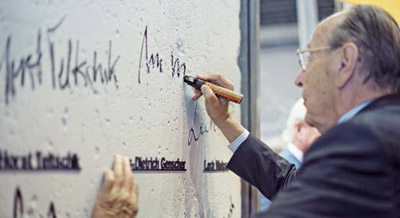
Hans-Dietrich Genscher was born on 21 March 1927. His father was a legal adviser to the Agricultural Association in Reideburg in Saalkreis. After moving to Halle, he attended grammar school and from 1943 served in Flak support, the RAD Reich Labour Service, and the Wehrmacht. After returning from American and British captivity, he passed the Abitur, joined the Liberal Democratic Party, and studied law from 1946 – 1949 in Halle and Leipzig. Subsequently he worked until 1952 as a law clerk at the Higher Regional Court of Halle, when he fled to West Germany. There he joined the FDP and was a law clerk at the Higher Regional Court of Bremen from 1952 – 1954 before working as an assistant solicitor and lawyer in the city until 1956.
In 1954, the Young Democrats of Bremen chose Genscher to be their deputy state chairman, but in 1956 he moved to Bonn to be a research assistant for the FDP parliamentary group. From 1959 – 1965 he was the director of the FDP parliamentary party. In 1962 he also became the party’s national executive director, and was a member of parliament from 1965 – 1998. He was the whip of the FDP’s parliamentary group from 1965 – 1969. In 1966 he joined the executive committee of the FDP in North Rhine-Westphalia, was elected the party’s deputy chairman from 1968 – 1974, and national chairman in 1974 – 1985. From 1969 – 1974, Genscher was at first Federal Minister of the Interior and Vice Chancellor in the SDP-FDP coalition under Chancellor Willy Brandt, and later the Federal Minister of Foreign Affairs from 1974 – 1982 under Helmut Schmidt. It was in this position that he developed an active policy of detente, worked hard for East-West dialogue, and was instrumental in the negotiations for the CSCE Final Act in Helsinki.
Under the Christian Democrat Chancellor Helmut Kohl, Genscher remained Foreign Minister from 1982 – 1992 and continued his policy of detente. At the same time he was involved in the integration of the members of the European Community. In January 1988, Genscher met the chairman of the outlawed trade union Solidarity, Lech Wałęsa, while on a visit to Poland, and promised to help the Polish opposition in their struggle for democratic reforms.
In 1989, Genscher supported the reforms in Poland and Hungary. And on 30 September that year, he announced to the East German refugees in the West German Embassy in Prague that they had been granted permission to leave for West Germany. In the following period, and particularly in 1990, Genscher was closely involved in the preparations and foreign policy negotiations towards German reunification in freedom and democracy – although his efforts took their toll on his health. His cautious attitude regarding external obstacles to the unification process created a certain amount of tension between him and Chancellor Helmut Kohl as well as the Chancellery, which was responsible for relations with East Germany. A key role was played by the ‘Two plus Four Talks’ concerning the external aspects of German reunification and the recognition of the Oder-Neisse line as Poland’s western border. Finally, on 12 September 1990, the ‘Two plus Four Agreement’ was signed, granting united Germany full sovereignty over its internal and external affairs.
In 1991, it was thanks to Genscher that Germany became the first country in the EU to officially recognize Slovenia and Croatia as independent states. In May 1992, Genscher resigned as Foreign Minister and Vice Chancellor, and that same year was made honorary chairman of the FDP. In the following years he conducted research and worked as a communication consultant, and in 1999 he returned to his career as a lawyer. Since the year 2000, he has been the managing partner of Hans-Dietrich Genscher Consult GmbH. Genscher continues to speak publicly about the events of 1989/90 and has become one of the most influential voices in the debate about the Peaceful Revolution and German reunification.
Hans-Dietrich Genscher has received numerous awards such as the Federal Order of Merit with Star and Sash, the Grand Cross of the French Legion of Honour, and Distinguished Service Crosses from both Poland and Hungary. He has also been granted honorary doctorates and honorary positions. He is married and has one daughter from his first marriage.
close -

Horst Teltschik
show biographyHorst Teltschik
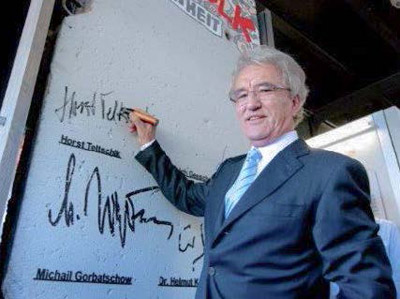
Horst M. Teltschik was born on 14 June 1940 in Klantendorf in the Sudetenland. His family fled at the end of World War II to Bavaria, where Teltschik’s father found work as a labourer in Tegernsee. Teltschik was active in the Catholic Youth Movement and passed the Abitur in 1960. He completed military service in the Bundeswehr, and from 1962 – 1967 studied political science, modern history and international law at the Free University in West Berlin. During his studies, he was chairman of the Association of Christian Democratic Students at the Free University and later became regional chairman of the Christian Democratic Youth Organization in West Berlin. After a spell as a research assistant at the Otto Suhr Institute for Political Science, Teltschik entered politics full-time in 1970. He began his political career as head of the Department of Foreign Affairs and German Policy at the CDU’s national headquarters in Bonn, and in 1972 he was made an adviser at the chancellery of the Minister-President of Rhineland-Palatinate, Helmut Kohl. Being one of Kohl’s closest advisers, in 1977 he became his office manager when Kohn was the chairman of the CDU-CSU parliamentary group. From 1982 – 1990, he headed the Department of Foreign and Intra-German relations, Development Policy and External Security, and in 1983 he was appointed Deputy Head of the Federal Chancellery.
After the Peaceful Revolution against the communist dictatorship in the GDR, Horst Teltschik was instrumental in the German-German and international negotiations that led to German unity on 3 October 1990. For example, deducing that the Soviet leadership was entertaining the possibility of German unification after a meeting on 21 November 1989 in Bonn with Nikolai Portugalov, a Soviet adviser at the Department of International Relations of the Central Committee of the CPSU, Teltschik urged Chancellor Kohl to seize the initiative regarding reunification. Kohl responded with his ten-point plan for German unity. Remaining Kohl’s personal adviser, Teltschik attended several international meetings at which he worked confidently towards reunification – often in disagreement with Germany’s Foreign Minister Hans-Dietrich Genscher. All in all, Teltschik made an outstanding contribution to the reestablishment of the German nation state.
In the following years, Teltschik worked in business, science, foundations and politics. From 1991 – 1992 he was the CEO of the Bertelsmann Foundation. From 1993 – 2000 he was on the board of BMW, where he was in charge of business and political affairs, and he was also the chairman of the corporation’s Herbert Quandt Foundation until 2003. In November 1996 he began teaching at Munich University of Technology, which made him an honorary professor in mid-2003. He also spent some time as President of Boeing Germany, the US defence and aerospace group, remaining there until 2006. Of particular significance is the fact that from 1999 – 2008, Teltschik headed the Munich Security Conference and hence played a crucial part in the development of Western and global defence strategies. Teltschik is a member of both the International Advisory Board of the Council on Foreign Relations in New York and the advisory board of the Atlantic Initiative in Berlin. From 2002 – 2010, he served on the board of directors of pharmaceutical company Roche.
Nowadays, Horst Teltschik has a number of honorary positions and has received some of the highest national and international awards. He is married with two children.
close -

Prof. Dr. Klaus Ewald Holst
show biographyProf. Dr. Klaus Ewald Holst
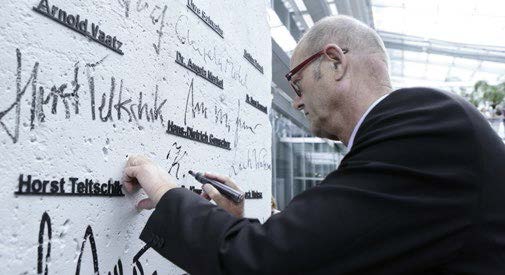
Klaus-Ewald Holst was born on 16 May 1943 in the town of Neustrelitz in Mecklenburg. He never met his father, who while in the Wehrmacht had fallen near Leningrad in October 1942. He grew up in simple circumstances with his mother, grandparents and two brothers. After passing his Abitur and taking an apprenticeship, he enrolled at the Saxon Mining Academy in Freiberg, where he studied deep drilling and oil/natural gas production until 1967. He also earned a doctorate there in 1977.
In 1968, Holst began working at Leipziger Verbundnetz AG (VNG) – which until 1990 belonged to the state-owned company Kombinat Schwarze Pumpe – at first as a development engineer, most recently as division head. During the Peaceful Revolution, Holst, a member of a bloc party, was politically on the side of the reformists. In December 1989 he sat at the ‘round table’ in Leipzig and played with the idea of running for mayor. However, when the next election was postponed, he abandoned his political career and made it his mission along with some of his colleagues to establish VNG as an independent company outside Kombinat Schwarze Pumpe. When this seemed almost impossible to bring about, Holst and his colleagues took over VNG in a surprise move and set up their own works committee. At his own initiative, Holst and the director of VNG travelled to Essener Ruhrgas AG, West Germany’s biggest gas importer, to set out their future plans – and found an important ally. Even before economic and monetary union between East and West Germany, VNG was converted into a public limited company, opening up the possibility of external investment. In August 1990, Ruhrgas announced that it would acquire a 35 percent stake in VNG, allowing it to remain an independent company in Leipzig. Ruhrgas proved to be a reliable partner, but after merging with E.ON sold its interest in VNG to EWE AG in 2002. Other shareholders such as BASF subsidiary Wintershall, Gazprom from Russia, and various local authorities in eastern Germany came on board as shareholders.
By this time, Holst was Deputy Chairman of VNG and elected the group’s first Chairman by the Supervisory Board on 5 October 1990, remaining in this position until 2010. Working in partnership with local authorities, he built up the Leipzig-based VNG into the leading gas supplier in eastern Germany and also installed an ultra-modern infrastructure. One important factor was that Soviet and then Russian natural gas had been imported through the Druzhba pipeline into first the GDR and then Germany since May 1973, and that the supply contracts were upheld by Russia and Gazprom. These imports were joined by gas supplies from Norway and the start of VNG’s own gas production in Norway. Consequently, in 1996 Norwegian natural gas began flowing to eastern Germany and nowadays accounts for a quarter of VNG’s gas imports. It was on this basis that, following high investment in the gas network, the heating market in eastern Germany could be converted from town gas to natural gas and connected to the West European pipeline system – which was a genuine energy revolution. Simultaneously, VNG’s international position was built up.
Holst was probably the most successful company director in eastern Germany after the Peaceful Revolution and German reunification. He turned VNG into the biggest independent gas utility in Germany and made it the only company in eastern Germany to join the top 100 German corporations. In 1998, Holst was appointed Consul of the Kingdom of Norway to the Free State of Saxony, and in 2005 Consul General for the regions of Saxony, Saxony- Anhalt, Thuringia and Brandenburg. He also took charge of the consulate in Mecklenburg-Western Pomerania. This was important not just for Holst personally but also for VNG as a whole – for as well as being an important gas supplier, it was also VNG’s partner regarding gas extraction in Norway. When Holst retired, he passed on these duties to his successor at VNG.
Today, Klaus-Ewald Holst lives in Leipzig and Heringsdorf. He is married with a son. In his 2013 autobiography ‘Bewegte Zeit – Ein Leben voller Energie’ (‘Moving Time – A Life Full of Energy’), he described not only his life but the corporate development of VNG as a contribution to the history of the Peaceful Revolution and the following two and a half decades from the view of a top manager. The numerous distinctions received by Holst include the Federal Order of Merit, and awards from Saxony, Norway and Poland. Since 1995 he has been an Honorary Senator of Saxon Mining Academy in Freiberg, which also appointed him Honorary Professor in 2007. Moreover, Holst is involved in several organizations and societies such as the German-Norwegian Association and the German-Russian Commodities Forum, enabling him to help others by living up to his motto of ‘Get rich and do good’. Holst also continues to work on governing bodies of the German energy supply sector.
close -

Lech Walesa
show biographyLech Walesa
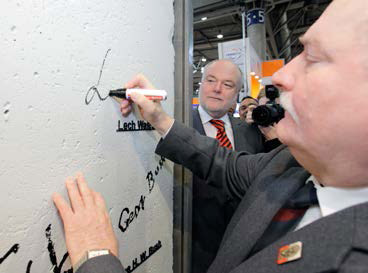
Lech Wałęsa was born on 29 September 1943 in Popowo, the son of a Catholic carpenter, who died in 1945 as a result of imprisonment in a Nazi concentration camp. Wałęsa was trained as an electrician in a state agricultural college before serving in the Polish Army for two years and then working as a car mechanic. In 1966, he began working at the Lenin Shipyard in Gdańsk. In 1970 there were riots in protest at the high food prices during which over a hundred people were killed. After Wałęsa had been dismissed in 1976 for his involvement in further protests, he was forced to do odd jobs in order to feed his family until he was allowed to return to work at the shipyard from 1980 – 1981.
Wałęsa became politically active in the Workers’ Defence Committees, edited an underground newspaper, and was a founding member of the first free trade union on the Polish coast. Between 1976 and 1980, he was arrested over a hundred times. In 1980, he and other workers at the Lenin Shipyard went on strike in protest at price rises for meat imposed by the government. He was elected chairman of the strike committee which spawned the National Coordination Committee of the free trade union Solidarity – the body which achieved considerable freedoms during negotiations with the communist government. The strike movement gave birth to the independent trade union movement Solidarity with 10 million members – and Wałęsa was the chairman of the national executive committee from 1981 to 1990.
The union grew into such a significant political force that the communists appointed General Wojciech Jaruzelski head of government, who then declared martial law on 13 December 1981. Like all the other leaders of Solidarity, Wałęsa was also imprisoned and the trade union crushed. Following his release from prison in early 1983, the dissident was theoretically permitted to return to work at the Lenin Shipyard, although to all intents and purposes he was kept under house arrest until 1987. Nevertheless, he still managed to organize the trade union movement underground and was given a personal boost by receiving the Nobel Peace Prize in 1983, despite not being allowed to collect it personally in Oslo.
After another wave of wildcat strikes throughout Poland, in autumn 1988 the communist government negotiated with Wałęsa who, in his role as chairman of the strike committee at the Gdańsk shipyard, then called off the strikes. Solidarity was legalized in the spring of 1989 and in February forced the government to take part in round table negotiations in which Wałęsa was the spokesman for the non-government side. One result of these talks was free elections, which turned into a disaster for the communist rulers and the entire Soviet system of domination. The Poles elected Solidarity candidate Tadeusz Mazowiecki the country’s first non-communist prime minister and in December 1990 voted in Wałęsa as president, an office he held until 1995. However, under the conditions of a free market economy and society, Solidarity’s significance declined sharply along with Wałęsa’s policy options. In 1995, he founded the Lech Wałęsa Institute, whose mission comprises preserving national heritage, research into contemporary history and Solidarity, and promoting Poland throughout the world. In 2000, Lech Wałęsa stood in the presidential elections again but received barely more than 1 percent of the vote.
Lech Wałęsa is married and has eight children. In addition to the Nobel Peace Prize, he has received some of the very highest awards, including the US Medal of Freedom and the Grand Order of Merit of the Federal Republic of Germany, Special Class. He has also been declared a freeman of various Polish cities and received literally dozens of honorary doctorates. In late 2007, he was inducted into the Committee of Wise Men set up to reflect on the future of Europe. On 1 January 2006, Wałęsa resigned from Solidarity after refusing to work together with the Law and Justice party.
close -

James Addison Backer III
show biographyJames Addison Backer III
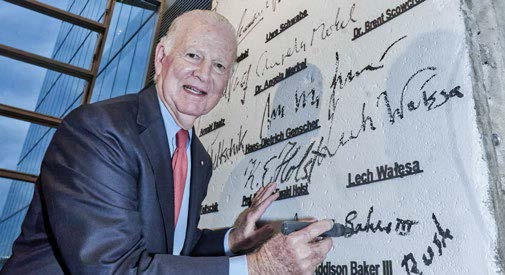
James Baker was born on 28 April 1930 in Houston, Texas, the son of lawyer James Addison Baker, Jr. and his wife Ethel Bonner (née Means). On graduating from high school in Pennsylvania, he studied at Princeton University until 1952. After serving as a lieutenant in the United States Marine Corps from 1952 – 1954, he enrolled at the University of Texas in Austin, where he earned a doctorate in law in 1957. He then practised at the law firm of Andrews & Kurth from 1957 – 1975 (with a hiatus from 1969 – 1973).
In addition, Baker began a political career. At first a member of the Democratic Party, he later switched to the Republicans. He struck up a political relationship with George H. W. Bush, the future President, and managed his un successful campaign for a seat in the US Senate in 1970. In 1975, Baker began working in President Gerald Ford’s administration as Undersecretary of Commerce and oversaw his 1976 election campaign. In 1980, he managed George Bush’s campaign in the Republican primaries when he was defeated by Ronald Reagan. When Reagan won the presidential election, in 1981 he made Baker his Chief of Staff in the White House. He remained in this position until 1985, before becoming Secretary of the Treasury and chairman of the Economic Policy Council in Reagan’s second cabinet until 1988.
James Baker chaired George H. W. Bush’s successful campaign in the next presidential election and was made Secretary of State. In his time as Secretary of State and Senior Adviser to the President until 1992, Baker pushed for German reunification and represented the USA in the ‘Two plus Four Talks’. Later on, in the 1991 Gulf War, he forged an alliance for the liberation of Kuwait with UN backing. After his resignation as Secretary of State in 1992, Baker was again made Chief of Staff in the White House, and following the election victory of Democrat Bill Clinton, he returned to his career as a lawyer.
In foreign policy, Baker was particularly prominent from 1997 – 2002 as an envoy of the UN Secretary General in an attempt to resolve the Western Sahara conflict. After assisting George W. Bush’s presidential bid in 2000, in 2003 Baker was appointed the US government’s Iraq envoy. In 2006 he tabled a plan for a way out of the military deadlock in Iraq.
Baker is married and has eight children. He has received some of the very highest honours such as the Presidential Medal of Freedom.
close -

Michail Gorbatschow
show biographyMichail Gorbatschow
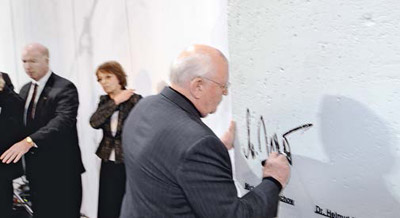
Mikhail Sergeyevich Gorbachev was born into a peasant family on 2 March 1931 in Privolnoye in the north Caucasus. While still at school, he worked in a collective farm’s machine-tractor station and joined the Komsomol communist youth organization. It was while studying law in Moscow from 1950 – 1955 that he joined the Communist Party of the Soviet Union (CPSU) in 1952. Following graduation, Gorbachev went to Stavropol, where he remained until 1978. He worked there as the First Secretary of the Komsomol City Committee, and then as Second and later First Secretary of the Komsomol Regional Committee, and was also head of the Department of Party Organs of the CPSU Regional Committee. His rise continued as of 1966 with the posts of First Secretary of the Stavropol City Committee of the CPSU, and then Second and later First Secretary of the Stavropol Regional Committee of the CPSU. In 1967, Gorbachev completed his second degree as an agricultural engineer.
Now a farming specialist, in 1970 Gorbachev became a member of the Supreme Soviet of the Soviet Union, and from 1971 – 1991 he was on the CPSU’s Central Committee. A protégé of Yuri Andropov, the former head of the Soviet secret police and later General Secretary of the Communist Party, it was at this time that Gorbachev first travelled to the West. From 1978 until 1985 he was the Central Committee’s Agricultural Secretary. In 1979 he was elected the first candidate member of the Politburo from the post-war generation, becoming a full member following year. Having become one of the most powerful men in the Soviet Union, Gorbachev sometimes stood in for Andropov when the latter was ill. After the deaths of both Andropov and his successor, Konstantin Chernenko, Gorbachev took the helm as General Secretary of the CPSU in 1985 at the age of just fifty-four. He campaigned for improved standards of work in industry, agriculture and administration, and tackled corruption and alcoholism. At the same time, he promoted international detente and called for arms control negotiations in all areas. He believed that the economy could be given a boost by fundamentally reforming the economic and political system, a process dubbed perestroika in Russian. Workers’ were to be encouraged to show initiative while elements of the free market were to be introduced. Meanwhile, Gorbachev’s policy of glasnost was supposed to make society more open and enable a critical view of history and the frank debate of current problems.
From 1985 – 1988, Gorbachev was also a member of the Presidium of the Supreme Soviet and then its Chairman – and thus Head of State. Moreover, until 1991 he was the Chairman of the Defence Council of the USSR. In these roles, he made repeated overtures to the USA in particular regarding disarmament and in February 1988 began withdrawing all Soviet troops out of Afghanistan. In July 1989, Gorbachev conceded that all the member states of the Warsaw Pact had the right to decide their own development and abandoned the ‘Brezhnev Doctrine’. Although Gorbachev cannot be said to have shaped the lead-up to German unification, it was to his great credit that he did not deploy the Soviet troops stationed in the East Germany to crush the Peaceful Revolution. Even so, he clung to the principle of two German states for a long time. Only in January 1990 did he change his mind regarding German unity, officially approving it the following month. Then again, Gorbachev still insisted unequivocally at this time that a united Germany should not be a member of NATO.
In 1990, Moscow was beset by internal disputes. Although Gorbachev became the first elected President of the Soviet Union in March and announced a controlled transition to a market economy, neither this nor the end of the Cold War enabled him to stabilize the domestic situation. Both economic difficulties, especially the food shortages, and the independence aspirations of non-Russian nationalities intensified rapidly. In Washington on 31 May, to the sheer astonishment of his negotiating partners, Gorbachev agreed that a reunited Germany should be allowed to choose which alliance it belonged to, to all intents and purposes giving the green light for Germany to join NATO. He repeated this concession during a meeting with German Chancellor Helmut Kohl in the Caucasus, albeit with the condition that no NATO ground forces ever be stationed in eastern Germany even after unification. In the end, having been pledged financial support by the Federal Republic of Germany, the USSR also signed the ‘Two plus Four Agreement’ granting united Germany full sovereignty over its internal and external affairs.
With Gorbachev’s initial policy on Germany having failed, back in the Soviet Union turmoil increased when he announced the end of the Warsaw Pact and declared that all the republics making up the Soviet Union would be permitted to secede under constitutional conditions. In August 1991, forces opposed to Gorbachev’s reform policy attempted to overthrow him. However, the coup quickly collapsed, particularly thanks to the resistance put up by Russian President Boris Yeltsin. Nevertheless, Gorbachev’s political descent accelerated. After Yeltsin had banned the CPSU on Russian soil, Gorbachev and Yeltsin dissolved the USSR on 21 December 1991. Shortly afterwards, Gorbachev resigned as President of the Soviet Union.
All in all, Gorbachev set in motion processes that led to the collapse of the Soviet empire and enabled German reunification. However, this was not his intention, but rather the outcome of his failed reform policy. Then again, he refrained from using military force in order to prevent it. Reforms could no longer save the ruling communist system and historical discussion snatched the carpet from under the feet of Marx ist-Leninist ideology. This took Gorbachev by surprise. He found no remedy for the decline, was probably not fully aware of the consequences of his actions, and hence liquidated the communist empire in spite of himself.
From 1992, Gorbachev became the president of the Foundation for Political, Economic and Social Research, worked as a columnist for international magazines, and in numerous speeches and writings defended his politics, which he described as social-democratic. On 8 October 2009, he co-founded the Independent Democratic Party of Russia, although it failed to gain any political traction.
Mikhail Gorbachev enjoys great international respect and has been presented with many awards, including the Grand Order of Merit of the Federal Republic of Germany, Special Class. However, his most important award is the Nobel Peace Prize, which was bestowed upon him in 1990. Gorbachev is widowed and has a daughter.
close -

Dr. Helmut Kohl
show biographyDr. Helmut Kohl
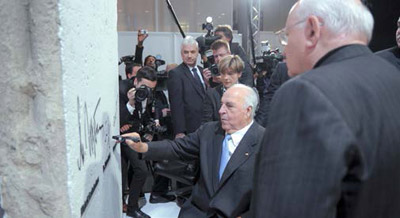
Helmut Kohl was born in Ludwigshafen on 3 April 1930. His father was a financial civil servant and Helmut grew up in a conservative, Roman Catholic family. He was enrolled at primary school in 1936 and progressed to the local high school. In 1944 he was drafted into a local fire-fighting crew before being evacuated with other children to first Erbach im Odenwald and then Berchtesgaden. The death of his older brother, who fell shortly before the end of World War II, proved to be a defining moment for him.
Helmut Kohl returned to Ludwigshafen in August 1945 aged fifteen and began a farming apprenticeship in Düllstadt, but broke it off owing to the lack of prospects. Instead, he returned to secondary school in Ludwigshafen and passed the Abitur in 1950. He began studying a variety of subjects in Frankfurt, namely international law, economics, history, political science and public law. In 1958, he completed his studies with a doctorate at the University of Heidelberg. Parallel to this, from 1956 – 1958 he was a research assistant at the political seminar of the university’s Alfred Weber Institute and also earned money as a labourer and a student trainee. In 1958 he was employed as an assistant to the director of Mock, a Ludwigshafen foundry. The following year he was appointed an assistant at the Industrial Union for Chemistry in Ludwigshafen, a position he held until 1960.
Kohl’s political career began when he joined the Christian Democratic Union in 1946 and co-founded the Ludwigshafen branch of the CDU youth organization Junge Union (‘Young Union’) in 1947. In 1953, he joined the executive committee of the Rhineland-Palatinate branch of the CDU. From 1954 – 1961 he was vice-chair of the Junge Union in Rhineland-Palatinate, and from 1955 – 1966 a member of the regional committee of the CDU in Rhineland-Palatinate. In addition to other political offices, from 1959 – 1976 Kohl was a member of the regional parliament in Rhineland-Palatinate, becoming first deputy chair of the CDU group in 1961 and chairman in 1963. From 1966 – 2000 he was a member of the national executive, and from 1969 – 1973 its deputy chairman. Finally, from 1973 – 1998, Helmut Kohl was the Chairman of the CDU. Subsequently made the Honorary Chairman of his party, he resigned from this position in 2000.
Helmut Kohl was elected Minister-President of Rhineland-Palatinate in 1969 and remained in this post until 1976. In this role, Kohl attached great importance to public accessibility, and in political terms directed his efforts towards structural reforms, fiscal policy, social policy, agriculture, and cultural and educational policy. Enacting a school reform, he transformed state denominational schools into community schools and established new universities in Trier and Kaiserslautern. He also oversaw administrative and territorial reforms as well as reforms to the social services and healthcare in the region.
Kohl was elected to the German Bundestag in 1976. After resigning as Minister-President, he headed the CDU-CSU parliamentary group and was hence the leader of the opposition. In 1982, Helmut Schmidt was toppled by a constructive vote of no confidence – the first occasion on which a reigning chancellor had been forced out of office in this manner. The Bundestag then voted in Helmut Kohl as the sixth Chancellor of the Federal Republic of Germany.
During the Peaceful Revolution, on 28 November 1989 Kohl surprised the Bundestag with a ten-point plan designed to overcome the division of Germany and Europe, despite not having discussed it beforehand with his coalition partners or the Western Allies. Nevertheless, it proved to be an important step towards German reunification, which was finally completed on 3 October 1990 after the knotty international Two plus Four Talks and tough negotiations with the representatives of the GDR. Kohl had become the first Chancellor of a reunified Germany and was also re-elected as such.
During his time in power from 1982 – 1998, Chancellor Kohl fundamentally transformed the Federal Republic of Germany. He brought the national debt under control, reduced unemployment, stimulated economic growth and reduced state involvement. He entered into negotiations with the Soviet Union and simultaneously implemented the NATO Double-Track Decision, earning himself trust in both East and West. But perhaps his greatest achievement was managing to persuade the victorious powers of the Second World War to back German unity. Then again, his accomplishments regarding Franco-German reconciliation and European integration (such as European Monetary Union and the introduction of the euro on 1 January 1999) were no less important.
After losing the general election in 1998, Kohl was hit by a scandal surrounding donations to the CDU in 1999. On 3 January 2000, the public prosecutor’s office in Bonn began investigating Kohl on suspicion of embezzlement to the detriment of his party. He compensated the CDU for any financial loss incurred out of his own pocket and the case was dropped in return for a fine of DM300,000. Despite these allegations, Kohl kept his seat in the Bundestag until 2002 and continued to promote reunified Germany and European integration across the world. After retiring from politics, Kohl worked as a lobbyist in various positions in the private sector and founded a political and strategic consultancy. In addition, he was involved in debate about the communist German dictatorship.
Kohl first wed in 1960, the marriage producing two sons. After a severe illness, his wife Hannelore committed suicide in 2001. In 2008, Helmut Kohl married a second time. Despite having to undergo several complicated operations and endure serious illness, he managed to write a multi-volume autobiography.
Helmut Kohl has been presented with some of the very highest honours. They include the Charlemagne Prize of Aachen (which he received together with François Mitterrand), the Grand Order of Merit of the Federal Republic of Germany, Special Class, and the US Medal of Freedom. He has also been declared an Honorary Citizen of Europe by the European Council, received several honorary doctorates, and been made a freeman of various cities.
close -

George H. W. Bush
show biographyGeorge H. W. Bush
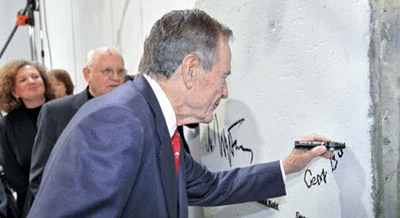
George Herbert Walker Bush, the forty-first President of the United States of North America, was born on 12 June 1924 in Milton, Massachusetts. His father, Prescott Bush, was a senator from Connecticut. George spent his childhood in Greenwich, Connecticut and graduated from the Philipps Academy in Andover in 1942, whose baseball team he had presided over as captain. After graduation he joined the US Navy, where he served during World War II as the youngest navy aviator hitherto. For this service, he was awarded the Order of Merit of Flight by the navy.
After the war, he continued his studies at Yale University before entering the Texan oil business by founding the company Zapata Oil in 1953. Bush’s political career began when he was elected chairman of the Republican Party in Harris County, Texas in 1962. When he ran for the Senate in 1964, he narrowly lost to his Democrat rivals. With the support of then-California Senator Richard Nixon, Bush was voted into the House of Representatives in 1966 and was returned two years later. He resigned in 1970 in order to try again for the Senate, but once again he was defeated.
Despite this setback, George H. W. Bush held important political and diplomatic offices in the following years, including Director of the CIA. After Bush had lost the Republican nomination to Ronald Reagan in 1980, he was invited to stand for Vice President. Together they won the election and Bush took over the coordination of all foreign and domestic activities of the government in times of crisis.
The Americans returned the President and his Vice President in 1984, and in 1988 Bush finally the achieved victory he had longed for when he stood for the presidency and won.
As President of the United States from 1989 to 1993, George Bush relied on military force, conducted for example the second Gulf War against Iraq, yet also forged the concept of a new world order intended to guarantee peace and freedom. To this end, in May 1989 he announced his aim to overcome the division of Europe on the basis of Western values. This included the principle that the German people had to regain their unity by means of free self-determination. Nevertheless, the US government responded to the fall of the Berlin Wall rather tentatively – which turned out to be the right move, given his strategy of winning the Cold War without duping the loser.
Another stage on the road to German unity was George Bush’s summit with Mikhail Gorbachev, the General Secretary of the Communist Party of the Soviet Union, on 2 and 3 December 1989 off Malta. The relationship of trust forged there was one of the foundations for the achievement of German reunification, which was supported by Bush and the United States more than any other international power. However, in the USA’s view, it was also essential that the newly united Germany be a member of NATO. Ultimately, Bonn was to handle the internal management of German unity and pay off the USSR, while the USA would support the unification process internationally and defend its security. This sharing of responsibility enabled Bush to largely shape this dramatic alteration to the world’s political make-up.
After the end of the Cold War, George Bush’s star began to wane. In particular, his decision not to seize Baghdad during the Iraq War was criticized from various sides. The tax increases enacted by Bush also contributed to his defeat at the hands of Democrat Bill Clinton during the next presidential election in 1992. Ever since this time, the Bushs have lived in Houston, Texas. Bush is married and the father of six children; his eldest son, George W. Bush, Jr., later became the forty-third President of the USA. Bush Senior has been presented with a string of domestic and foreign awards.
close -

Prof. Kurt Masur
show biographyProf. Kurt Masur
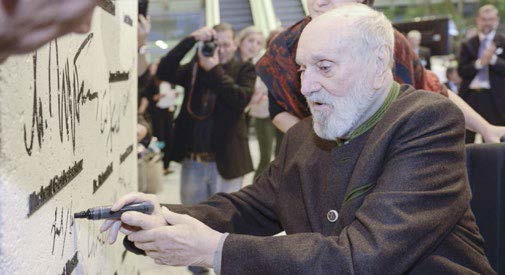
This widely acclaimed, world-famous conductor was born on 18 July 1927 in the Silesian town of Brieg (nowadays the Polish town of Brzeg). His father was the proprietor of an electrical store, and Kurt Masur trained to be an electrician before working for his father’s firm. After his interest in the piano had been sparked by his elder sister’s abilities on the same instrument, he, too, began learning the piano, and later on also played the organ in the local church. From 1942 – 1944, Kurt Masur studied the piano and the cello at the regional school of music in Breslau (now Wrocław). After being drafted into the Wehrmacht paratroopers in 1944/45, he continued his musical training from 1946 – 1948 at the conservatoire in Leipzig. No longer able to stretch the little finger of his right hand, he decided to become a conductor, and studied the piano, composition and conducting.
Kurt Masur began his career as répétiteur and conductor at the theatre in Halle (Saale) from 1948 – 1951 before becoming the principal conductor at Städtische Bühnen in Erfurt until 1953. He was then appointed principal conductor at Städtisches Theater in Leipzig. From 1955 – 1958, he conducted the Dresden Philharmonic Orchestra. Afterwards, he spent two years as the general director of music at the Mecklenburg Regional Theatre in Schwerin followed by four years with the Komische Oper of East Berlin under Kurt Felsenstein. From 1964 – 1967, he performed in various European countries and in Brazil, and from 1967 – 1972 he was the chief conductor of the Dresden Philharmonic.
With effect from 24 August 1970, Kurt Masur succeeded Václav Neumann as the conductor of the Gewandhaus Orchestra in Leipzig. With Masur at the helm, the orchestra gained an international reputation, primarily through more than 900 concerts while on tour. Since the orchestra had lacked a permanent home ever since its venue had been destroyed in an air raid in 1943, Kurt Masur successfully campaigned for the erection of a new concert hall, which was opened as the (third) Gewandhaus in 1981.
Kurt Masur has been an honorary professor at Felix Mendelssohn Bartholdy University of Music and Theatre in Leipzig since 1975 and an honorary member of the Gewandhaus Orchestra since 1981. His time in charge of the Gewandhaus Orchestra ended on 31 December 1996, and he was proclaimed honorary conductor of the orchestra at his retirement ceremony in February 1997.
In summer 1989, Kurt Masur stood up for the street musicians persecuted by the ‘security forces’ in Leipzig and allowed them to put across their views in public at the Gewandhaus. During the 1989/90 Peaceful Revolution against the communist German dictatorship, he joined up with three SED officials, a comedian and a theologian to write the appeal by the ‘Leipzig Six’. Their plea for dialogue and the relinquishment of violence played an important part in ensuring that no blood was spilled in Leipzig.
From 1991 – 2002, Kurt Masur was also the music director of the New York Philharmonic, and worked as the principal conductor of the London Philharmonic Orchestra from 2000 until 2007. In 2002, he was made the music director of Orchestre National de France in Paris, a position he held until 2008. Kurt Masur is also an Honorary Guest Conductor of the Israel Philharmonic Orchestra.
The conductor’s works encompass a rich repertoire. They include recordings of compositions by the likes of Bruckner, Dvorák, Mendelssohn, Prokofiev and Tchaikovsky produced in East Germany as well as in post-reunification Germany and abroad. Apart from performances of music by a large number of other composers, particular mention should be made of his recordings of all nine of Beethoven’s symphonies and all of Mozart’s piano concertos. He has also conducted performances and recordings of several operas.
Masur’s first marriage lasted until 1996 and produced two sons and a daughter. His second wife, whom he married in 1971 and with whom he fathered another daughter, died in a car accident in 1972. Kurt Masur has been married to his third wife, a Japanese soprano, since 1975. Their son is now a successful conductor in his own right. In 2012, Kurt Masur announced that he had Parkinson’s disease. Having suffered a number of falls, he now performs rarely and conducts from a wheelchair. Although he lives in Leipzig and New York, he plans to give his final concert at the Gewandhaus in Leipzig.
Masur has received some of the highest national and international awards. He is a Freeman of the City of Leipzig and has been awarded an honorary doctorate by the University of Leipzig. Having received the National Prize, 1st Class in the GDR, he was declared an honorary senator of Felix Mendelssohn Bartholdy University of Music and Theatre in Leipzig in 1989. He is one of the founders of the Leipzig Cultural Foundation and was its first president. In addition, Kurt Masur is a member of the executive committees of the German National Foundation, the Saxon Academy of Arts, and the Berlin Academy of Arts.
close -

Christoph Wonneberger
show biographyChristoph Wonneberger
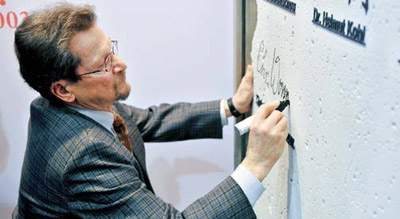
Christopher Wonneberger was born the son of a Protestant pastor in the town of Wiesa in Saxony on 5 March 1944. Barred from taking the Abitur by the SED, he first trained to be a machinist before studying languages at the Theological Seminary in Leipzig. In 1965, Wonneberger began studying theology in Rostock and then went to Dresden to be a curate.
While in Prague in 1968, he protested against the aggression by the Warsaw Pact against the reformist socialists in Czechoslovakia. Upon his return to East Germany, he was arrested for wearing a badge bearing the inscription ‘Dubcek-Svoboda’ (‘Freedom for Dubček’). Starting in 1969, he was in touch with dissidents in Poland, learned Polish, and studied the theory of non-violent resistance.
A Protestant pastor in various Saxon towns from 1971, from 1977 – 1984 Wonneberger conducted ‘open work’ in the Dresden Vineyard parish, increasingly attracting the interest of young non-conformists and advising conscientious objectors. Wonneberger’s goals were to push back the boundaries of ‘counter-culturalism’ and stem the increasing militarization of the SED dictatorship. Encouraged by NATO’s decision to offer the Warsaw Pact the mutual limitation of ballistic missiles, Wonneberger responded with a proposal for a Social Peace Corps throughout East Germany as an alternative to military national service. The SED declared his scheme to be unconstitutional and stage-managed by the West, and had Wonneberger arrested in 1982. Although the Saxon church leadership intervened to secure Wonneberger’s release, it also tried to persuade Wonneberger to abandon his peace policy. Nevertheless, demands for a Social Peace Corps persisted and were one of the causes sparking the Peaceful Revolution in 1989/90. The Stasi regarded Wonneberger as one of the most dangerous dissidents and conducted a number of operations against him.
In 1985, Wonneberger went to St Luke’s Church in the Leipzig district of Volkmarsdorf. In 1986, he began coordinating the prayers for peace at St Nicholas’s Church. Prayers for peace had been introduced in Leipzig in 1981 and adopted by Wonneberger at the Church of the Epiphany in Dresden the following year in the hope that they would be emulated elsewhere. These services were organized by action groups and explored the balance between worship, public protest and political activity. In 1987, Wonneberger and the Human Rights Group co-founded by him went public with a demand for an open society which guaranteed human rights, and repeatedly supported protests organized by action groups. Although Wonneberger was no longer responsible for coordinating the prayers for peace as of August 1988, the SED was unable to put a stop to them altogether since the parish council of St Nicholas’s Church and Pastor Christian Führer refused to buckle under state pressure. In May 1989, the prayers for peace spilled out of the church and onto the streets, spawning the Monday Demonstrations in Leipzig which shook the dictatorship to the core. Wonneberger continued to keep the Western media abreast of events in Leipzig, organized an alternative church congress in July 1989, maintained a ‘demo phone’ with opposition groups, and became a co-organizer of the prayers for peace and the subsequent demonstrations in September and October. All in all, he made a significant contribution to the revolutionary development.
On 30 October 1989, Christopher Wonneberger suffered a cerebral infarction with the paralysis of his speech muscles, ruling him out as one of the active protagonists as the Peaceful Revolution gathered pace. During his lengthy treatment and rehabilitation, the Saxon church leadership relieved him of his pastoral ministry in 1991. Only in recent years has Wonneberger begun speaking in public again and taking part in the present-day assessment of the East German opposition and the Peaceful Revolution. In 1995, Wonneberger was awarded the Order of Merit of the Federal Republic for his achievements. In 2002 he was presented with the German National Prize together with Christian Führer, Uwe Schwabe and the Leipzig Citizens’ Movement Archive. Wonneberger has two children from his marriage. Having separated from his wife, he now lives in Leipzig with his partner.
close -

Christoph Magirius
show biographyChristoph Magirius
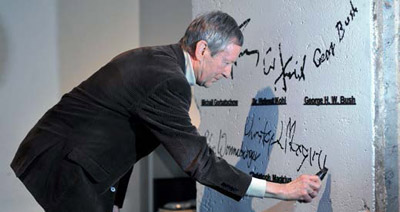
Born on 20 February 1937 in the town of Meerane in Saxony, Christoph Magirius studied Protestant theology at the Martin Luther University of Halle-Wittenberg. He then worked as a curate in Pillnitz (near Dresden) and in the Neustadt district of Dresden. From 1962 to 1972, he worked as a Lutheran pastor in three villages, including Rückmarsdorf near Leipzig. In the city of Leipzig, Magirius was appointed a student pastor in 1972, before becoming the Protestant dean from 1979 until September 1990 in Karl-Marx-Stadt (nowadays Chemnitz). After the Peaceful Revolution, Magirius was made the pastor of St Andrew’s Parish in the Chemnitz district of Gablenz, remaining there until 1999.
In the 1980s, Magirius acted as a negotiator between the SED dictatorship in Chemnitz and the Protestant Church. In his role as dean, he endeavoured to bring about mutual understanding and to ensure that any conflicts were resolved peacefully. As one of the leaders of the civil rights movement in Saxony, the activities for peace by Christian citizens and opposition groups were very close to his heart, and he went to great lengths to protect and nurture them. During the Peaceful Revolution, Magirius was one of the people in Karl-Marx-Stadt (since renamed Chemnitz) to campaign for an atmosphere of tolerance, non-violence, dialogue and democratic engagement. This proved critical to the success of the Peaceful Revolution in Karl-Marx-Stadt, which had a refuge in both dean’s office and the parish office. At St John’s Church, Magirius was elected to the ‘Group of 25’, a committee representing citizens’ interests. He also initiated and chaired the Chemnitz ‘town hall meetings’ at St John’s Church, where demands were voiced such as for the release of political prisoners, human rights, freedom to demonstrate, freedom of travel, and permission for New Forum to operate. Magirius also successfully called for dialogue to be supported by means of thematic demonstrations. The dean’s mediating role won approval from the city council and the mayor. Thanks to his role in the ‘town hall meetings’, Magirius became one of the co-organizers of the ‘round tables’ in the city and region of Chemnitz. Here, he campaigned for dialogue between the civil rights movement, the public, the local authority, and representatives of the SED dictatorship.
In Chemnitz (the ‘City of Modernity’), after German reunification Magirius was closely involved in peaceful action against right-wing extremists. He joined the Agenda 21 Advisory Board in Chemnitz, which tried to mediate between NGOs, individual citizens, organizations and municipal facilities. Agenda 21, which was founded at the Earth Summit in Rio de Janeiro in 1992, was also committed to sustainable global development and disapproved of living at the expense of others or future generations. Magirius is a co-organizer of Peace Day, which has been commemorated on 5 March every year since 2002. By campaigning against the far right, xenophobia and demonstrations by neo-Nazis as well as for civil society, he keeps the legacy of opposition, resistance and revolution alive.
Magrius is revered and respected in Chemnitz by all walks of life and across the political spectrum. Among his many awards, he was most notably declared a Freeman of Chemnitz on 3 October 1990.
close -

Stephan Bickhardt
show biographyStephan Bickhardt
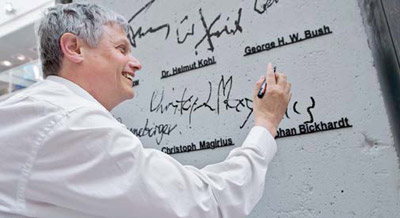
Born in the Niedersedlitz district of Dresden on 3 September 1959, theologian and civil rights activist Stephan Bickhardt comes from a pastor’s family. Especially his father Peter played an important role in the GDR opposition. From 1976 Stephan Bickhardt participated in ‘Action Reconciliation’ and took up Protestant ‘open work’. In 1977/78 he was an apprentice toolmaker, during which time he took part in a strike by the trainees. Firmly refusing to do military service, he then studied theology and took teacher-training until 1986 at the Catechetical Seminar in Naumburg (Saale) and Sprachenkonvikt in East Berlin. After attending Edelbert Richter’s philosophy study group in Naumburg, Bickhardt became acquainted with members of the opposition such as Wolfgang Templin and Gerd Poppe. Bickhardt joined various opposition groups and established links between Protestant churches, church-based action groups and the independent cultural scene. He co-founded the Social Peace Corps and in May 1985 was a co-organizer of the Initiative for Non-alignment in Europe. In 1986 he got in touch with the Peace and Human Rights Initiative, deliberately leaving the ecclesial sphere. In addition to his work from 1986 – 1989 as a student adviser in the offices of the Protestant Student Community and as a curate, he was in contact with Czech dissidents. Bickhardt also played a prominent role in the writing and distribution of underground literature, his publishing house named radix-Verlag probably being the main publisher of samizdat with the most intelligent programme.
Prior to the Peaceful Revolution, in 1986 Stephan Bickhardt was a co-organizer of the application for ‘Rejection of the Practice and Principle of Demarcation’ submitted to the synod of the Evangelical Church of Berlin-Brandenburg and the Federal Synod of the Evangelical Churches in the GDR. Poetry readings organized with Ludwig Mehlhorn in private homes and the ‘Call for New Action’ to monitor the elections on 7 May 1989 falsified by the SED as well as participation in the counting of ballot papers had a major impact. During the Peaceful Revolution, Bickhardt was one of the strategists in the group which set up the civic movement Democracy Now moulded by Christian social ethics. In 1990 he became its chairman, a member of the council, and the spokesman of the regional committee.
In the spring of 1990, Bickhardt organized the election campaign for Alliance ’90/The Greens and temporarily conducted the affairs of the House of Democracy in central Berlin. Democracy Now campaigned more resolutely than others for the rule of law, the abolition of the SED’s claim to leadership enshrined in the GDR’s constitution, democratic elections and the German unity.
In 1990/91, Bickhardt completed his curate training and in 1991 began working as a pastor in Eberswalde, Brandenburg. From 1995 – 2006 he was the chaplain of the Protestant Student Community at the University of Leipzig, after which he was appointed pastor of the parish of Grossstädteln-Grossdeuben. Since November 2007, Stephan Bickhardt has also been Leipzig’s police chaplain. In 2002, he stood in temporarily as the second pastor at St Thomas’s Church in Leipzig.
Even today, Stephan Bickhardt still speaks out on issues such as the opposition in East Germany, the Peaceful Revolution and contemporary problems. He is married with three children.
close -

Joachim Gauck
show biographyJoachim Gauck
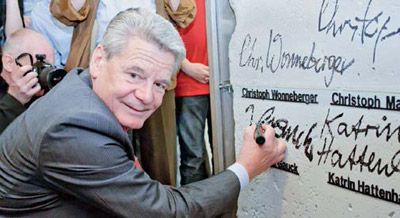
Joachim Gauck was born the son of a captain in the merchant navy in Rostock on 24 January 1940. His mother was an office manager in a law firm. Gauck’s father was arrested in 1951, sentenced to twenty-five years’ imprisonment by a Soviet military tribunal in Schwerin for alleged espionage and ‘anti-Soviet agitation’, and deported to Siberia. Fortunately, he was pardoned and returned to Rostock in 1955.
Gauck went to school in Rostock and passed his Abitur in 1958. He condemned the communist system in the GDR, and the popular uprising of 17 June 1953 had a liberating impact on him. Although exempted from military service in the NVA, his career aspirations of becoming a journalist were thwarted. Instead, after studying theology in Rostock from 1958 – 1965, he worked as a curate in Laage. He decided to become a pastor and after his ordination found his place in the Lutheran Protestant Church in Mecklenburg. He first worked in Lüssow in the district of Güstrow before being assigned to Evershagen – a large prefabricated housing estate in Rostock. In addition, Gauck worked as a youth pastor in and around Rostock, and from 1982 – 1990 managed church congress work in Mecklenburg, preparing the two regional congresses in 1983 and 1988 in Rostock. The atmosphere at the 1988 congress was buoyed by the reformist policy of Soviet leader Mikhail Gorbachev, and demands for similar changes in the GDR were voiced.
Although Gauck was under observation by the Stasi until 1988, he was not in touch with the opposition groups which had been operating in Mecklenburg since the mid-1980s.
During the Peaceful Revolution, Gauck was one of the initiators of the protest movement in Rostock and headed in the weekly services followed by demonstrations in 1989/90 at Saint Mary’s Church. On 19 October 1989, he held a sermon on the prophet Amos in which he compared ‘murderous self-righteousness’ to the ‘justice of salvation’, yet also advocated staying in East Germany instead of emigrating. Gauck considered the revolution of 1989/90 as a defining event for him and as the coming to fruition of the ideals of the French Revolution.
Joachim Gauck was elected speaker of New Forum in his hometown, and from March to October 1990 was a member of the People’s Chamber representing the New Forum electoral coalition following East Germany’s first free general election. On 21 June 1990, he was placed in charge of the committee monitoring the disbanding of the Stasi and its successor organization. Gauck was one of the initiators of the Stasi Records Act of 24 August 1990 regulating the political, legal and historical analysis of the files of the SED’s secret police. On 28 September 1990, Gauck was elected Special Representative for the Stasi Records by the People’s Chamber almost unanimously, a choice confirmed by Chancellor Helmut Kohl and President Richard von Weizsäcker on 3 October. In response, Gauck resigned as a member of parliament and from the Mecklenburg Regional Church. In his new role, he resolutely opposed the destruction of the secret police’s files and their transfer to the federal archives in Koblenz, declaring their critical analysis to be an essential basis for the development of democracy in eastern Germany.
In December 1991, following the adoption of the Stasi Records Act, Gauck was appointed Special Representative of the Federal Government for the Stasi Records by the German Bundestag. In 1995, his term of office was renewed by another five years. Gauck’s work in this department (which increasingly came to be referred to as simply ‘The Gauck Department’) enjoyed high recognition and respect, but was also vilified as a witch hunt by supporters of the SED dictatorship. Furthermore, he was criticized for employing a handful of former Stasi agents.
During his time in this department and thereafter, Gauck endeavoured to make sure that the erstwhile communist dictatorship would not be forgotten. From January to November 2001 he hosted a television programme called ‘Gauck meets …’, and in the same year was appointed the German member of the European Monitoring Centre for Racism and Xenophobia. From 2003 until 2012 he served as the honorary chairman of the association ‘Against Forgetting – For Democracy’, which studied the two German dictatorships. He also wrote on this theme, and was one of the initiators behind both the 2008 Prague Declaration on European Conscience and Communism signed by prominent European politicians, former political prisoners and historians (which called for 23 August, the date of the Molotov-Ribbentrop Pact, to be established as a European day of remembrance of the victims of both Stalinism and National Socialism) and the 2010 Declaration on Crimes of Communism. Gauck held a variety of other honorary positions, too.
On 30 June 2010, Gauck stood for Federal President as the candidate of the SPD and Alliance ’90/The Greens. However, he was defeated in the third ballot – despite achieving a creditable 494 votes – by Christian Wulff, the Minister-President of Lower Saxony and the candidate favoured by the ruling coalition comprising the CDU/CSU and FDP. But following Wulff’s resignation in February 2012, Gauck was overwhelmingly elected the eleventh President of the Federal Republic of Germany on 18 March 2012 by the Federal Assembly as the joint candidate of the CDU/CSU, SPD, Alliance ’90/The Greens and the FDP.
In his role as Federal President, the concept of freedom is of particular importance to Gauck. He regards himself as a “left-wing, liberal conservative” and an “enlightened patriot”. He argues for a socially responsible market economy, for the further expansion of the welfare state, and for reasonable curbs on free enterprise. Gauck is critical of the electronic surveillance of German citizens by intelligence services from abroad such as the USA’s NSA and considers peacekeeping missions abroad by the Bundeswehr justified. Furthermore, he supports an economically sustainable energy transition and public participation in the political process, and believes that Muslims living in Germany are also part of the country.
Gauck married Gerhild Gauck in 1959 and had four children with her who all suffered political repression in the GDR. He separated from his wife in 1991 and has lived with journalist Daniela Schadt since 2000.
Joachim Gauck lives in Berlin and has received some of the highest national and international awards, including the Theodor Heuss Medal, the Grand Federal Order of Merit with Star, the Grand Cross of the Order of Saint Charles, and the Grand Cross with the Chain of the Order of Merit of the Italian Republic. He has been awarded an honorary doctorate by the University of Rostock and declared a freeman of his hometown.
close -

Katrin Hattenhauer
show biographyKatrin Hattenhauer
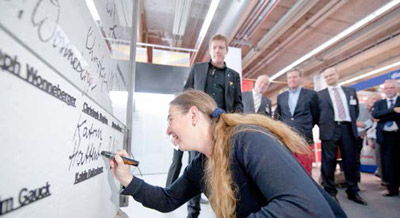
Born on 10 November 1968 in Nordhausen in Thuringia, Katrin Hattenhauer was not allowed to take the Abitur at school in the GDR. Instead, she worked at the local theatre as a puppeteer, then at Wittenberg Church Re search Home, and completed an internship at Dresdner Zion Community. In 1988 she began studying theology at the Theological Seminary in Leipzig. In her office, there was a duplicator used for leaflets written by the opposition. Under pressure from the SED or government agencies, Katrin Hattenhauer was expelled (despite the rector’s attempts to protect her) for distributing flyers in January 1989 publicizing a demonstration for peace and human rights.
Hattenhauer worked in several critical church action groups such as the ‘Working Group for Justice’. In the pre-revolutionary summer of 1989, she was one of the organizers of the Leipzig street music festival in June (alongside for instance Jochen Lässig) and helped coordinate the peace prayers at St Nicholas’s Church. However, her oppositional activities were monitored by the Stasi. Katrin Hattenhauer was repeatedly interrogated by the secret police and almost completely banned from working. Nevertheless, in August 1989 she spoke up in favour of a hunger strike at St Thomas’s Church, criticized the SED’s leadership role, and called for people to take part in political protests. After she had unrolled a banner reading ‘For an open country with free people’ together with Gesine Oltmanns at the first Monday demonstration after the summer break on 4 September 1989 – an important step towards the development of the Peaceful Revolution – she was arrested by the Stasi on 11 September outside St Nicholas’s Church. These and other arrests sparked protests throughout the GDR, including among people who had remained uninvolved hitherto, and triggered a wave of solidarity with the detainees. Hattenhauer and other protesters who had been arrested were remembered with flowers and candles displayed in a window of the church.
Katrin Hattenhauer remained in custody on Dimitroffstrasse in Leipzig until 13 October 1989 and bravely refused to make a statement. After the Peaceful Revolution, she was active in civil society, including in 1991 by helping to set up the Leipzig Citizens’ Movement Archive, which in 2014 was awarded the German National Prize.
Katrin Hattenhauer now lives with her family in Berlin and Pella (Italy), makes a living as an artist, and organizes exhibitions, events and art projects – including devoted to a key theme for her: freedom. At the Festival of Lights marking the twentieth anniversary of the turning point on 9 October 1989, she spoke to well over a hundred thousand people on Leipzig’s Augustusplatz on behalf of the East German citizens’ movement.
close -

Rudolf Seiters
show biographyRudolf Seiters
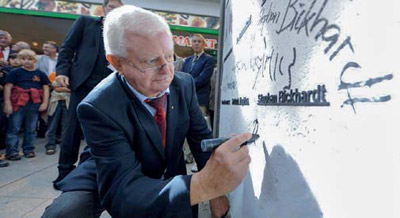
Born in Osnabrück on 13 October 1937, after passing the Abitur, Rudolf Seiters studied law and political science at the University of Münster, graduating in 1967 after successfully taking the Second State Law Exam. While at university, he joined the Young European Federalists and the fraternity W.K.St.V Unitas-Winfridia in Münster.
Seiters has been a member of the CDU since 1958. That year, he founded the Bohmte chapter of the CDU youth organization Junge Union (‘Young Union’). From 1963 – 1965 he was district chairman of the Junge Union in Osnabrück-Emsland before becoming the organization’s chairman for first Hannover and later Lower Saxony until 1968. Seiters was on the national executive of the Junge Union, the national executive of the CDU, and from 1972 until 1998 deputy chairman of the CDU in Lower Saxony. In addition, he was also a member of the CDU’s Presidium from 1992 – 1998.
After initially working as a government assessor for the Chief Administrative Officer’s Department of Trade, Industry and Housing Construction in Osnabrück from 1968 – 1969, Seiters was repeatedly directly elected to the German Bundestag, where he represented the constituencies of Emsland and Unterems from 1969 until 2002. In the Bundestag, he was the parliamentary whip and senior whip of the CDU-CSU parliamentary group. From 1994 – 1998, he was its deputy chair, and from 1998 – 2002 Seiters was Vice-President of the German Bundestag.
Parallel to his membership of the Bundestag, on 21 April 1989 Seiters was appointed Federal Minister for Special Affairs and Head of the Federal Chancellery by Chancellor Helmut Kohl, making him responsible for bilateral relations with the GDR. He played a critical role in a wide variety of negotiations as an analyst, coordinator and policy manager during the Peaceful Revolution and the preparations for German reunification. On 30 September 1989, he accompanied German Foreign Minister Hans-Dietrich Genscher to Prague in order to tell the East Germans camped out in the West German Embassy that they had been permitted by the GDR authorities to emigrate to the West.
Seiters also maintained ties with GDR dissidents. For instance, on 25 January 1990, he met leading representatives of the opposition participating in the Central Round Table in East Berlin in order to learn their opinions regarding future development, especially the possibility of German reunification. Later on, he held further meetings with civil rights activists and with the ministers without portfolio in Prime Minister Hans Modrow’s government. Following the completion of German unity, from 1991 – 1993 Seiters served as the Federal Minister of the Interior. When Red Army Faction terrorist Wolfgang Grams and an officer in the GSG 9 counter-terrorism unit were killed in an exchange of fire during a police operation in Mecklenburg, Seiters took responsibility and resigned. Since 2003, Seiters has been the president of the German Red Cross.
Rudolf Seiters has been presented with numerous awards. He has received the Federal Order of Merit with Star, and in 2000 he was given an honorary doctorate by the Bundeswehr University in Munich. He is married, lives in Papenburg, and has three daughters.
close -

Werner Schulz
show biographyWerner Schulz
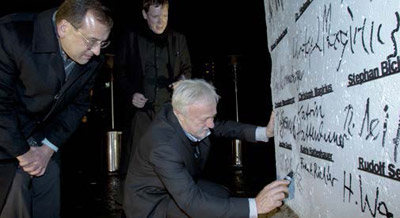
The son of a former professional army officer, Werner Schulz was born on 22 January 1950 in the town of Zwickau in Saxony, where he also grew up. Despite not having joined the Young Pioneers, the youth organization for schoolchildren, he was still allowed to attend high school from 1964 – 1968 and take the Abitur in combination with vocational training as a locomotive fitter. He then took an engineering degree in food technology at Humboldt University in East Berlin, graduating in 1972. He remained at Humboldt University as a research assistant.
Like many other members of the East German opposition, Werner Schulz’s political awareness was awakened when the hopes for democratic socialism associated with the Prague Spring in 1968 were dashed after its violent suppression by Warsaw Pact troops. Consequently, he joined peace, ecology and human rights action groups which were allowed to operate under the protection of a number of East German Protestant churches. After protesting against the expulsion of singer-songwriter Wolf Biermann, from 1976 until 1978 he did non-military national service. Openly disapproving of the Soviet invasion of Afghanistan, he was dismissed from Humboldt University before completing his thesis. Schulz was forced to join the Recycling Institute as a researcher, and from 1988 – 1990 headed the environmental sanitation unit in the Department of Hygiene Inspection in the Berlin district of Lichtenberg.
Being a member of the oppositional Pankow Peace Group, in May 1989 Schulz publicly criticised the fraudulent local elections held in the GDR. During the Peaceful Revolution, in autumn 1989 he joined New Forum and was sent to revolutionary Leipzig as an intermediary. While there, he took part in the decisive Monday Demonstration on 9 October 1989 in which more than 70,000 people protested against the communist dictatorship, prompting him to move the focus of his political activity to Leipzig and Saxony for the next two years. During the Revolution, he also represented New Forum at the Central Round Table of the GDR, becoming involved in the drafting of a new constitution and the reunification of the two German states under Article 146 of the Basic Law.
After East Germany’s first free parliamentary elections, Schulz represented his party from March to October 1990, and was the spokesman of Alliance ’90/The Greens. After reunification, he was delegated to the German Bundestag as an east German member. In parliament, he campaigned for the proposed new national holiday to be held on 9 November (partly because it was the date of the fall of the Berlin Wall) rather than 3 October, the date of German unification (which was ultimately chosen). In 1990, the electoral bloc consisting of Alliance ’90/The Greens and the Citizens’ Movement achieved 6 percent of the votes in eastern German, enough to enter the Bundestag, whereas the west German Greens failed to surmount the 5 percent hurdle. Schulz acted as the spokesman for the eight-strong parliamentary group and also served as its whip.
On 21 September 1991, members of Democracy Now, the Initiative for Peace and Human Rights and New Forum launched Alliance ’90 as a political party. Schulz was one of its nine equal speakers until 1993, when he agreed with the party’s merger with the Greens to form Alliance ’90/The Greens. He rejected cooperation with the PDS as it was a successor to the SED and campaigned for the possibility of a coalition with the CDU-CSU to be considered.
From 1994 until 1998, Schulz was his party’s whip in the Bundestag. He was also a member of parliament when his party was in power in coalition with the SPD. However, he failed in his attempt to be elected Mayor of Leipzig in 1998. From 1998 – 2005, he was his group’s parliamentary spokesman on economic affairs and matters concerning eastern Germany. In the Bundestag, he stood out as a brilliant speaker as well as for always speaking his mind and not being afraid of being regarded as an outsider. In 2005 he stood as a direct candidate in Berlin’s Pankow constituency but was beaten by his rival Wolfgang Thierse. Not given a safe list place by his party, he spent some time outside the legislature.
From 2009 – 2014, Schulz was a member of The Greens | European Free Alliance group in the European Parliament. In this time he was the deputy chairman of the EU-Russia Parliamentary Cooperation Committee and was a member or deputy member of the Committee on Foreign Affairs, the Euronest Parliamentary Assembly, the EU-Ukraine Parliamentary Cooperation Committee, the EP Delegation for Relations with Belarus, and the Committee on Economic and Monetary Affairs.
A Protestant, Werner Schulz has contributed much to the study of the communist German dictatorship. These days, he lives in the Uckermark in Brandenburg. He has been presented with prestigious awards such as the Federal Order of Merit and the German Unity Award.
close -

Frank Richter
show biographyFrank Richter
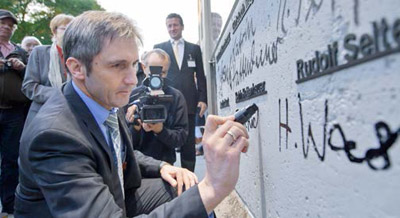
Born in Meissen on 20 April 1960, Frank Richter passed his Abitur in 1978 in the town of Grossenhain in Saxony. Conscripted into the National People’s Army from 1979 to 1981 but refusing to bear arms, he was allowed to perform non-military work in Stralsund. He then studied theology in Erfurt and Neuzelle and in 1987 was ordained a Catholic priest. From 1987 – 1994, he worked as a chaplain and curate at the Church of the Cross in Dresden.
Participating in the demonstrations in Dresden in October 1989, on 8 October Richter was caught up in a police kettle on Prager Strasse. Together with chaplain Andreas Leuschner, he managed to negotiate with the police. The ‘Group of 20’ emerged spontaneously from among the demonstrators and was later joined by Herbert Wagner, later to become the Mayor of Dresden. This was the first time that anyone in the SED leadership – in this case the incumbent Mayor Wolfgang Berghofer – had agreed to peaceful dialogue with protesters. This paved the way for the Peaceful Revolution, which became irreversible on 9 October when the Monday Demonstration in Leipzig was attended by more than 70,000 people.
As a member of the ‘Group of 20’, Richter continued to play an active role in the democratic movement in the GDR and later on after reunification in the analysis of the history of German dictatorships and right-wing radicalism. His work with young people was especially important to him. From 1997 – 2001, he was the chairman of the Saxony Children’s and Youth Ring, and made conceptual contributions to the design of the school curriculum. He also organized youth activities, including educational events and meetings for young people. On leaving Dresden, Frank Richter moved to the diocese of Meissen, where he served as diocesan youth minister from 1994 – 1996. This was followed by a pastorate in the Saxon town of Aue from 1997 – 2001. Finally, from 2001 – 2006, he worked as an adviser on religion and ethics for the Saxon State Institute of Education and School Development in Radebeul (the Comenius Institute). He then left Saxony to become a parish priest at the Old Catholic Church in Offenbach am Main from 2006 – 2008, and in 2007/08 worked as a grammar school teacher of ethics and Latin in the town of Langen in Hessen. Since 2009, he has been the director of the Saxon State Agency for Political Education.
Richter left the priesthood in 2005 to marry, switching to the Old Catholic Church. He has received several awards for his activities, such as the Saxon Constitution Medal and the Federal Order of Merit. In 1991 he accepted the European Human Rights Prize on behalf of all the peaceful demonstrators against the SED dictatorship in autumn 1989.
close -

Dr. Herbert Wagner
show biographyDr. Herbert Wagner
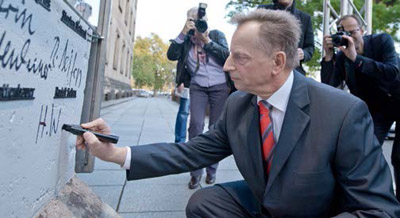
Herbert Wagner was born in Neustrelitz, Mecklenburg, on 21 September 1948 after his family had had to leave the area around Ústí nad Labem in Czechoslovakia following the Second World War. Wagner’s grandfather had been the village mayor while his father was a civil engineer. In Neustrelitz, Wagner attended primary school. Being a Catholic, he rejected the SED dictatorship’s hostile policy towards the church and refused to attend the socialist coming-of-age ceremony. Even so, he was allowed to take the Abitur at high school in 1967, which he passed. After an apprenticeship as a heating engineer, Herbert Wagner did military service with the NVA. In 1969, he began studying information electronics at Dresden University of Technology, graduating as an electrical engineer in 1973. In 1985, he was awarded a doctorate.
Having completed his training, Wagner began his career as a development engineer in a state-owned combine in Dresden. Being opposed to the SED dictatorship and condemning the lack of free speech in the GDR, Wagner joined a ‘Catholic academic circle’, which he headed as of 1975.
During the Peaceful Revolution against the SED dictatorship, the clashes between demonstrators and the regime’s armed forces were more violent than in any other German city. The flashpoint occurred when thousands of people tried to reach the trains taking refugees from the West German embassy in Prague through Dresden Central Station on their way to the West. The brutality displayed by the armed forces culminated in pitched battles with protesters on 4 October 1989, and was only halted when the Group of 20 spontaneously formed by demonstrators four days later opened talks with Wolfgang Berghofer, the Mayor of Dresden, about ending the violence and introducing democracy. Herbert Wagner was a member of the Group of 20, and in November 1989 he became one of the co-organizers of the Monday Demonstrations in Dresden. In January 1990 he was made chairman of the newly established ‘grassroots democratic group’ on the city council in Dresden.
In February he joined the CDU and, after the first free local elections in May that year, replaced Berghofer as Mayor of Dresden, remaining in office until 2001. During this time, he was also the President of the Saxon Association of Municipal Councils and the Deputy President of the German Association of Cities. In 2011, Wagner was appointed CEO of Dresden data network company KDN GmbH.
Being chairman of the executive committee of Bautzen Memorial Dresden and on the advisory board of the Saxon Memorial Foundation Commemorating the Victims of Political Tyranny, Herbert Wagner plays a prominent role in present-day analysis of the SED dictatorship. Furthermore, Saxony’s Minister-President Stanislaw Tillich appointed Wagner head of the expert commission advising the government of Saxony on how best to mark the twentieth and twenty-fifth anniversaries of the Peaceful Revolution and German unity in 2004 and 2008.
Wagner is the recipient of numerous awards such as the Saxon Constitution Medal and the Saxon Order of Merit. He has also been symbolically awarded a ‘Nobel Peace Prize’ by a Member of the European Parliament for his prominent role in the Peaceful Revolution. He is married with three children and lives in Dresden.
close -

Heino Falcke
show biographyHeino Falcke
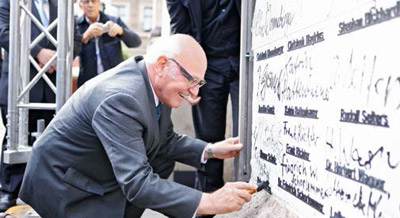
Born in Riesenburg in west Prussia on 12 May 1929, Heino Falcke took his Abitur in 1946 in Seehausen (Altmark). From 1946 – 1951 he studied Protestant theology in Berlin, Göttingen, and also Basel, where he additionally worked as a student assistant for Karl Barth. In 1952, Falcke decided to work in East Germany as a pastor; owing to his theological convictions, he was keen to help a church that was beleaguered by communism. Falcke passed the first theological examination in 1952 in Halle an der Saale. This was followed by a period as a curate in Salzwedel, and in 1953 he successfully took the second theological exam in Magdeburg. In 1958, he earned a doctorate as a research assistant at the Institute of Systematic Theology at the Faculty of Theology at the University of Rostock and habilitated there in 1961. Previously, he had been director of studies at the Theological Seminary in Wittenberg from 1954 – 1956.
After his time at university, from 1958 – 1964 Falcke was a pastor in Wegeleben (east Harz) and from 1964 – 1973 the director of Gnadau Seminary of the Protestant Church of the Union. In 1973 he was appointed provost of the Diocese of Erfurt of the Protestant Church of the Church Province of Saxony. In 1970 he joined the BEK Committee for Church and Society of the Federation of Protestant Churches in the GDR, becoming its chairman from 1974 – 1987. Since 1975, he has also been a member of the relevant committee of the World Council of Churches in Geneva.
Falcke was one of the most important Protestant theologians under the SED dictatorship and also in eastern Germany following reunification. He greatly influenced the thinking of his church with his focus on Christians in the GDR, safeguarding peace and protecting Creation and the environment, as well as his lectures and many writings. One major contribution was his keynote ‘Christ the Liberator – and the Church is for All’ at the BEK Synod in 1972 in Dresden. It was here that Falcke called for political freedom and social accountability, and denounced the state’s monopolization of citizens and church. His starting point was the ‘hope for an improvable socialism’ in which the churches would take political responsibility. The ruling SED opposed this idea and had Falcke observed and targeted by the Stasi under ‘Operation Milan’. Nevertheless, when Falcke attended the VI Assembly of the World Council of Churches in Vancouver in 1983, he tabled a motion for the preparation of a peace council of all Christian churches.
In pursuit of this idea first put forward by theologian Dietrich Bonhoeffer before he was murdered by the Nazis, in the run-up to the Peaceful Revolution, Falcke was the deputy chairman of the Ecumenical Assembly of Churches in the GDR for Justice, Peace and Protection of Creation in 1988 and 1989. Applying the motto ‘think globally – act locally’, he attached great importance to working with church action groups with strong peace ethics. One main tenet of his political attitude and state-critical theology was his fear of the military and environmental endangerment of Eastern and Western civilization. He responded by calling for environ mental problems to be addressed in connection with the demand for more democracy. In 1987, he submitted a motion by the oppositional ‘Initiative for the Rejection of the Practice and Principle of Demarcation’ to mitigate the consequences of Germany’s division at the Synod of the Protestant Church Federation. And during the Peaceful Revolution, he was involved in disbanding the Stasi in Erfurt and was chairman of the ‘round table’ in the Erfurt district.
After 1989, Falcke criticized the rapid process of the unification of both church and state, and attended European and global ecumenical gatherings. In 1994, Falcke retired, yet continued to serve in various bodies of the Protestant Churches in Germany and critically assessed social and political problems. For instance, in 1997 he was among the first signatories of the ‘Erfurt Declaration’, which under the slogan ‘Stand up for a different policy’ called for the CDU-FDP coalition under Chancellor Helmut Kohl to be replaced by a pact between the SPD, Alliance ’90/The Greens and the PDS. And in 2008 he joined up with others to issue a call for ‘Peace with Capital? A call to resist the Protestant Church’s conformity with the might of industry.’
Falcke is married, lives in Erfurt (the capital of Thuringia), and has received several awards for his work. They include an honorary doctorate from the Faculty of Theology of the University of Bern in 1984 and an honorary doctorate from the University of Siegen in 2012.
close -

Dr. Friedrich Schorlemmer
show biographyDr. Friedrich Schorlemmer
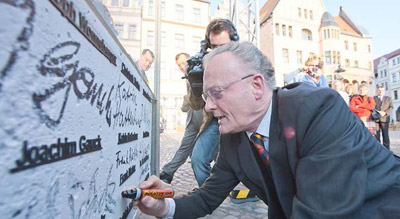
Friedrich Schorlemmer was born the son of a Protestant minister on 16 May 1944 in Wittenberge (Prignitz) on the Elbe, and grew up in Werben in the Altmark. Barred from high school because of his social background, Schorlemmer passed his Abitur at a community college in 1962 and refused to do military service in the National People’s Army. From 1962 to 1967, he studied theology at the Martin Luther University in Halle/ Wittenberg. In 1968 he became a curate in west Halle and a director of studies at a hall of residence for Protestant students.
After his ordination in 1970, Schorlemmer worked as a youth and student pastor in Merseburg from 1971 – 1978. From 1976 he was a member of both the synod at the level of the Saxony-Anhalt Regional Church and the Church Federation of Protestant Churches at the GDR level. On leaving Merseburg in 1978, Schorlemmer began working at the Protestant Theological Seminary in Wittenberg and as a preacher at the local Castle Church. From 1992 – 2007, he was the director of studies at the Protestant Academy of Saxony-Anhalt in Wittenberg. What was important for the peace movement in the GDR was that from 1988 – 1989 he was a volunteer adviser for the Ecumenical Assembly of Churches in the GDR for Justice, Peace and Protection of Creation. After Schorlemmer had taken part in protests against the GDR’s new constitution and the invasion of Czechoslovakia by Warsaw Pact troops in 1968, in the 1970s he joined the East German peace, human rights and environmental movement. In 1980, he set up a Protestant action group, which was kept under observation by the SED’s secret police in an operation codenamed ‘St John’. One of his most notable oppositional activities was his literal enactment of the motto ‘swords to ploughshares’ accompanied by his peace group during the Church Congress of the Saxony-Anhalt Regional Church in 1983 in Wittenberg on Lutherhof (‘Martin Luther’s Courtyard’). This symbolic act performed in the presence of Richard von Weizsäcker, the President of West Germany, was of great importance for the entire anti-communist opposition in the GDR and spread its initiator’s fame abroad.
It became also a symbol of the peace movement in the GDR and an appeal for a continuous policy of disarmament and détente between East and West. In 1988, with the same group, Schorlemmer presented ‘twenty Wittenberg theses’ for the extensive democratization of the GDR at the Protestant Church Congress in Halle.
During the Peaceful Revolution, Schorlemmer was one of the founders of the civil rights group and political party Demokratischer Aufbruch (‘Democratic Awakening’). At the huge demonstration for democracy on 4 November 1989 on Alexanderplatz in East Berlin, Schorlemmer was one of the main speakers. Yet Schorlemmer also stuck to his guns by signing the appeal ‘For our country’ on 28 November 1989 calling for the preservation and democratization of the GDR. After Democratic Awakening had moved closer to the CDU in January 1990, Schorlemmer and other members on the left of the party left to join the SDP, the East German social democrats. Schorlemmer went on to head first the SDP group and later on the SPD on the local council of Wittenberg from 1990 until 1994. Since 1991, Schorlemmer has been a member of the PEN Centre of Germany, the German UNESCO Commission and the Willy Brandt Circle, and in 1992 he was one of the initiators of the Forum for Enlightenment and Renewal set up to assess the SED dictatorship. In 1997, Schorlemmer was one of the first to sign the Erfurt Declaration calling for a pact between the SPD, Alliance ’90/The Greens and the PDSto replace the German government under Chancellor Helmut Kohl and pronouncing that the ownership of property also entailed social responsibility. This appeal failed to catch on, just like Schorlemmer’s 1999 idea of declaring an amnesty for GDR offenders. Schorlemmer was opposed to the war in Afghanistan and the invasion of Iraq in 2003 by the USA and its allies. In 2010, he joined forces with others to set up the left-wing political think-tank ISM (Institut für Solidarische Moderne).
Schorlemmer is a father and grandfather, is divorced, and nowadays lives in Wittenberg and Werben. He is still active in politics and journalism. Within the attac network he highlights the dangers of globalization, and has so far written more than thirty monographs on historical, political, theological and philosophical questions. In 2012, Schorlemmer’s autobiography was published under the title Klar sehen und doch hoffen (‘See clearly and still hope’), which could also be viewed as the motto of this popular yet contentious East German theologian and civil rights activist.
Among Schorlemmer’s numerous awards, special mention should be made of the Carl von Ossietzky Medal of the International League for Human Rights, the Peace Prize of the German Book Trade, and the Federal Order of Merit, First class.
close -

Lothar de Maizière
show biographyLothar de Maizière
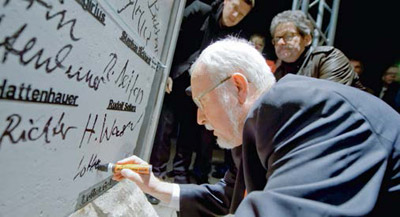
Musician and lawyer Lothar de Maizière was born on 2 March 1940 in Nordhausen, the son of a lawyer. He grew up in East Berlin, where he completed school in 1958 by passing the Abitur. In 1956 he joined the East German CDU. He studied the viola at the Hanns Eisler Academy of Music from 1959 – 1965 and performed in various orchestras such as the East Berlin Radio Symphony Orchestra. When de Maizière was forced to give up music due to nerve inflammation in his left arm, he took a correspondence course in law at the Humboldt University from 1969 – 1975.
In 1976, Lothar de Maizière, now a fully qualified lawyer, joined the bar in East Berlin and specialized in East German business and tax law. He also acted for Christians who had come into conflict with the dictatorship as well as for youngsters suffering political persecution due to conscientious objection or pacifist activities. In 1987, the East Berlin Lawyers’ Association elected Lothar de Maizière its deputy chairman. From 1985 – 1990 he was a member of the Synod of the Federation of Protestant Churches in the GDR and its deputy president, and in 1987 he joined the CDU Working Group for Church Affairs.
During the Peaceful Revolution in the GDR, the East German CDU elected de Maizière its chairman in November 1989. That same month, he joined Hans Modrow’s government led by the SED as Minister of Ecclesiastical Affairs and Deputy Chairman of the Council of Ministers. Supported by the West German CDU, and in cooperation with the opposition groups Democratic Awakening and German Social Union within the Alliance for Germany, the CDU won the first free parliamentary elections to the People’s Chamber on 18 March 1990. Lothar de Maizière, the GDR’s new Prime Minister, formed a coalition government with the SPD and the Liberals. Right from the start of its work on 12 April 1990, it began preparing rapid unification with West Germany which was achieved on 3 October 1990, despite the collapse of the coalition government in August. Shortly beforehand, de Maizière had been appointed Deputy Chairman of the all-German CDU and joined Chancellor Kohl’s government as Federal Minister for Special Affairs. At this time, he was among the deputies from the People’s Chamber who had been delegated to the Bundestag of the reunified Germany.
In November 1990, Lothar de Maizière became chairman of the CDU in Brandenburg and was voted into the Bundestag a little later. Owing to unresolved allegations concerning collaboration with the Stasi, he resigned as a Federal Minister on 19 December 1990. When these allegations could not be proved, he returned to his political duties in February 1991. However, differences with the CDU’s headquarters in Bonn over the CDU’s political course in eastern Germany could not be resolved so easily, and in September 1991 he resigned as both Kohl’s deputy in the CDU and a member of the Bundestag, and retired from politics entirely. In 1992, additional allegations of working for the Stasi surfaced. Even so, de Maizière still speaks up about current issues and discusses the SED dictatorship nowadays. Lothar de Maizière comes from a Huguenot family, is married and has three daughters. After his retirement from politics, he worked in executive positions of the company Hunzinger Information AG. In 1996, he began working in his own law firm in Berlin specializing in questions of reunification. De Maizière is involved in various civic organizations such as the Berlin Foundation for the Protection of Listed Buildings, Petersburg Dialogue and the German Society. The awards he has received include Freeman of the City of Nordhausen, the Russian Order of Friendship, and the Quadriga Award in the category ‘Architecture of Unity’.
close
cities and signatures
| 30.10.2009 |
George Herbert Walker Bush Dr. Michail S. Gorbatschow Dr. Helmut Kohl |
Berlin Axel-Springer-Haus |
| 18.03.2010 |
Dr. Lech Watesa Christoph Wonneberger |
Leipzig (Leipzig Book Fair) |
| 10.05.2010 | Christoph Magirius | Chemnitz (Saxon Museum of Industry) |
| 07.06.2010 | Stephan Bickhardt | Munich (Olympia Shopping Centre) |
| 20.07.2010 | Prof. Dr. Horst M. Teltschik | Essen (Hall 6, Shaft XII of Zollverein Coal Mine) |
| 25.08.2010 | Dr. Hans-Dietrich Genscher | Stavanger, Norway (Offshore Northern Seas) |
| 03.09.2010 | Dr. Rudolf Seiters | Neubrandenburg (Marktplatz-Centre) |
| 06.10.2010 |
Dr. Joachim Gauck Kathrin Hattenhauer |
Frankfurt (Frankfurt Book Fair) |
| 18.10.2010 |
Frank Richter Dr.-Ing. Herbert Wagner |
Dresden (light well of the Town Hall) |
| 11.11.2010 | Werner Schulz | Brussels (Bibliothethèque Solvay) |
| 17.11.2010 | Dr. Lothar de Maiziere | Nordhausen (council offices on the market square) |
| 28.03.2011 | Dr. Friedrich Schorlemmer | Wittenberg (Old Town Hall) |
| 01.06.2011 | Dr. Heino Falcke | Erfurt (Town Hall) |
| 30.10.2011 | Arnold Vaatz | Hoyerswerda (Lausitzcenter) |
| 12.06.2014 | Dr. Angela Merkel | Berlin (Saxony’s Mission to the German Government) |
| 08.10.2014 |
James Addison Baker Prof. Dr. Klaus-Ewald Holst Leslie Mandoki Uwe Schwabe Prof. Dr. Kurt Masur Matthias Platzeck |
Leipzig (VNG) "25th Anniversary of the Peaceful Revolution" |
| 13.11.2014 | Dr. Brent Scowcroft | Washington D. C. |
About the artist
Michael Fischer-Art (Michael Fischer)
Michael Fischer-Art was born on 13 March 1969 in Leipzig. On leaving secondary school, from 1985 – 1987 he completed an apprenticeship as a bricklayer and painter. While taking part in the second oppositional River Pleisse Memorial March, he was arrested by the East German police. He was then arrested again...
read moreMichael Fischer-Art (Michael Fischer)
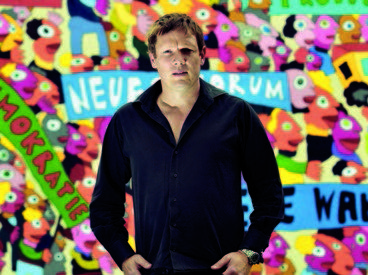
Michael Fischer-Art was born on 13 March 1969 in Leipzig. On leaving secondary school, from 1985 – 1987 he completed an apprenticeship as a bricklayer and painter. While taking part in the second oppositional River Pleisse Memorial March, he was arrested by the East German police. He was then arrested again on a number of occasions by the police after attending prayers for peace at Leipzig’s St Nicholas’s Church. During the Peaceful Revolution, he painted banners for the Leipzig Monday Demonstrations. He subsequently worked as a caretaker and nurse in a psychiatric ward. In 1992, Fischer-Art passed his Abitur, enabling him to study graphic design at HGB Leipzig Academy of Visual Arts until 1997. Now a freelance artist, his work has since taken him to many places outside Leipzig.
Fischer-Art describes his style using intense colours and comic-like figures on a large area as ‘free-market realism’. He feels a bond with the history of Leipzig, especially the Peaceful Revolution, and the fall of the Berlin Wall, and repeatedly addresses socio-critical themes. In addition, he campaigns for human rights. He has executed numerous works in public spaces, especially in Leipzig and elsewhere in eastern Germany. Furthermore, he is in touch with politicians and other leading lights from the worlds of industry and show business, resulting in a wealth of portraits of for example German Chancellor Angela Merkel and Mikhail Gorbachev, the former General Secretary of the CPSU. The artist has displayed his works at various exhibitions in Germany and abroad. Michael Fischer-Art lives in Leipzig and is married with three children. When still a student, he was presented with the award ‘Young Artists See Their City’. In 2004, he was nominated by the Saxon CDU to attend the 12th Federal Assembly, which elected the German President.


